Text
Valentine's Special ~ Aerith/Tifa from Final Fantasy VII: Remake (Compilation)
youtube
Since today is Valentine’s Day, and FFVII: Rebirth is releasing at the end of this month, it’s the perfect time to get caught up on Aerith/Tifa, a.k.a. Aerti, a.k.a. possibly the most unexpected F/F ship in gaming! Here is what I consider to be the most comprehensive compilation of Aerti scenes from FFVII: Remake, prepared by yours truly for your viewing (and shipping) pleasure :)
Quick sales pitch: While Aerith is famously The One Who Dies and Tifa is known for her sexy character design, they are also popularly remembered as main character Cloud’s two equally appealing love interests, as attested to by one Robert Pattinson. However, just as the elements present in the original 1997 game Final Fantasy VII were expanded on and added to in FFVII: Remake, the relationship between Aerith and Tifa was also fleshed out… to the point where it became very, very easy to ship them together. To put it in Tumblr terms, it’s like Betty and Veronica, but taken in a different – but still (subtextually) gay – direction compared to Riverdale. Check out the video above, it's just 1.5 hours!
(Longer sales pitch / commentary below the cut)
Originally from the hit 1997 Japanese role-playing game Final Fantasy VII, Aerith and Tifa, along with the main character Cloud Strife, were one of the most famous love triangles of video games at the time, and arguably even now. (Note: Think Betty and Veronica (Archie but pre-Riverdale), or if you’re more familiar with anime, Rei and Asuka (Neon Genesis: Evangelion) or Saber and Rin (Fate: Stay Night).) Although they barely had any interactions together and really were primarily love interests for Cloud in the original game (and subsequent related works), the relationship between Aerith and Tifa was significantly more fleshed out in Final Fantasy VII: Remake (2020), going beyond your standard box-ticking “look, girl power!” exercise. There seems to have been many a fan who walked out of playing Remake who found Aerti (i.e. Aerith and Tifa’s relationship) memorable – whether read romantically or platonically – resulting in many GIFs, fanart, and even compilations of memorable scenes of their “friendship”.
Not only do they interact with each other outside of speaking about Cloud or other male characters (scraping a pass in the Bechdel test, yay!), Remake gives the relationship space to develop from “strangers who hit it off” to “individuals who care about and trust each other”. Significantly, Aerith is the one who seems to take Tifa’s concerns the most seriously and comfort her, and Tifa is also able to see past Aerith’s cheery façade and reach out to her at her times of greatest need. In my opinion, each of the pair offers the greatest emotional support to the other out of all the characters – even more than what they do for Cloud (or what Cloud does for them).
So what makes their relationship romantic rather than simply platonic to me (other than sheer force of will)? Even though there isn’t really any direct flirting or explicitly romantic lines, there are a number of moments which are framed romantically or parallel romantic moments between Cloud/Aerith or Cloud/Tifa. Perhaps the most obvious of this is when Tifa protects Aerith from falling (twice), which is animated and shot in a way which suggests that it’s just as swoon-worthy as when Cloud protected Tifa from a fall in a prior scene. However, another notable example is how the high-five gesture is linked to Cloud’s opening up to Aerith (as he has to be persuaded over the course of several scenes to do the high-five), but Aerith also high-fives Tifa in other scenes later, effectively appropriating the gesture. So while I never expect it to ever become canon, Remake’s Aerti has been a wonderful surprise and I hope to see even greater developments in their relationship within this subtextual space as the FFVII: Remake trilogy progresses.
Let's all hope for the best-- in the meantime, please enjoy this compilation!
#i may write up a proper ship manifesto for them at some later date#“may” being the operative word here#btw my favourite moment is when tifa finds aerith in the train graveyard#truly a “surely any person with a drop of romantic attraction to women would fall for tifa if they were in aerith's position!” moment#final fantasy vii#final fantasy vii: remake#ff7#ffvii#ffviir#ff7r#final fantasy 7 remake#aerti#aerith#tifa#aerith gainsborough#tifa lockhart#wlw recommendations#(but subtext)#femslash#list#final fantasy#jrpg#jrpg games#aerith x tifa
28 notes
·
View notes
Text
Queer Women in Qing China: Chen Yun & Han Yuan in Six Records of a Floating Life

(Pak Suet Sin as Chen Yun (left) and Yam Kim Fai as Shen Fu (right) in Madam Yun, dir. Chu Kea, 1960)
Despite being written by a relatively unremarkable man, Shen Fu's (沈復) Qing-era autobiography Six Records of a Floating Life (浮生六記) captured the public imagination for its depiction of an unusually loving married couple - namely the author and his wife Yun - and for being very sad, because the wife died young after a protracted battle with illness and poverty. Their tragic tale has inspired films, TV series, stage plays, Chinese operas, and musicals.
But for some reason (spoiler alert: it's homophobia), as far as I can tell (see note 2 below the cut), the derivative media all fail to mention that while Yun certainly loved Shen Fu, there was also someone else she loved-- a female courtesan named Han Yuan, whom she convinced her husband to take on as concubine. Although there are only a few references to Han Yuan throughout the book, her impact is outsize, making her absence from the various adaptations all the more glaring.
So let's try to rectify things, shall we? Extracted here are all the references to the relationship between Yun and Han Yuan contained in Six Records of a Floating Life - although I haven't included all the other nods to Yun's fruitiness, so do check out the book in full - click below!
Overview
The happily married Chen Yun falls for the female courtesan Han Yuan and the two soon become sworn sisters (see note 1 below). Then, to ensure they can remain together, she manages to persuade her husband to take the latter as his concubine despite his protestations that they cannot afford another mouth to feed. This turns out to have unfortunate consequences: Yun's in-laws, who she was already on thin ice with, are highly critical of the two women's relationship, and have the married couple expelled from the familial home. Further, while Yun and her husband are living elsewhere, a wealthy man pressures Han Yuan into leaving and becoming his wife instead. Yun falls into despair and the heartbreak causes her already-delicate condition to deteriorate, leading to her eventual demise.
Note 1: Sworn kinship is the most widely-available Chinese custom allowing for the formalisation of a relationship between individuals of the same gender, other than those specifically hierarchical in nature (e.g. adoption, godparents, mentorship, etc.). While not primarily romantic in association, there is certainly precedent for it: arguably the most famous Chinese love story, The Butterfly Lovers, focuses on the romance between a man and a cross-dressing woman who swore an oath of brotherhood. Even after the latter reveals that she is female, there are repeated references to their oath, and the man continues to refer to her using familial terms (賢弟/"worthy younger brother" is simply switched to 賢妹/"worthy younger sister").
Note 2: As far as I can tell, Han Yuan really does never come up in the various derivative works. However, there is some (mostly very mild) hinting regarding the in-laws' disapproval stemming in part from Yun's failure to conform to cishet norms; at least three of the adaptations from Hong Kong take as the flashpoint an incident where Yun dresses as a man in order to enjoy the Mid-Autumn festivities with her husband (see the GIF in the header) and is discovered, despite it not having had any negative consequences in the book. (There is such a cross-dressing scene in the 2021 Kunqu opera adaptation, but for some reason, in that version, Yun seems to have been on great terms with her in-laws and there was no disownment at all.) AFAIK the only adaptation that explicitly deals with Yun's queerness is the 1987 dance production from Hong Kong, wherein the disownment happens after a scene which I'll just describe as "the Mid-Autumn Festival incident, but as a boat ride which Yun turns into a threesome between herself, the boat-girl, and her husband". This actually pulls from the source material, as there is a somewhat suggestive episode involving a boatsman's daughter (this is a few pages before Han Yuan is introduced - I did say Yun was fruity)... but it's interesting that the creators decided to depict her queerness through a drunken one-night stand where she's dressed in male clothing (which was not the case in the original, though the boat-girl does still know she's a woman in this version), instead of committing to her much deeper relationship with Han Yuan.
A (probably-incomplete) list of adaptations
Fei Mu/费穆’s 1943 stage play Six Records of a Floating Life/浮生六记 (PRC)
1947 film Six Records of a Floating Life/浮生六记 (PRC) – dir. Pei Chong/裴冲, starring Su Shi/舒适 and Sha Li/沙莉
1954 film Madam Yun/芸娘 (Hong Kong) – dir. Ng Wui/吳回, starring Cheung Wood-Yau/張活游 and Pak Yin/白燕 – full movie
1960 Cantonese opera film Madam Yun/芸娘 (Hong Kong) – dir. Chu Kea/珠璣, starring Yam Kim Fai/任劍輝 and Pak Suet Sin/白雪仙 – full movie; also see my posts on it here and here
1987 dance performance Six Records of a Floating Life/浮生六記 (Hong Kong) – dir. Chan Kai-Tak – full performance
Cantonese opera Shen San Bai and Madam Yun/沈三白與芸娘 (Hong Kong) – multiple productions from different theatre companies across the years – clip
1974 TV drama Madam Yun/芸娘 (Hong Kong)
Zhou Mian/周眠's 2018 Kunqu opera Six Records of a Floating Life/浮生六记 (PRC) – multiple productions – clip 1 | clip 2
Luo Zhou/罗周's 2021 Kunqu opera Six Records of a Floating Life/浮生六记 (PRC) – multiple productions – full performance (w/ English subtitles)
Tian Chenming/田辰明’s 2021 musical Six Records of a Floating Life/浮生六记 (PRC) – multiple productions – clip
2023 Peking opera Six Records of a Floating Life/浮生六记 (PRC) – assorted clips
Extracts from Six Records of a Floating Life, trans. Leonard Pratt and Chiang Su-Hui, 1983, Penguin Books
Part I – The Joys of the Wedding Chamber
(p.48)
In the seventh month of the Chiayen year of the reign of the Emperior Chien Lung I returned from Yuehtung with my friend Hsu Hsiu-feng, who was my cousin’s husband. He brought a new concubine back with him, raving about her beauty to everyone, and one day he invited Yun to go and see her. Afterwards Yun said to Hsiu-feng, “She certainly is beautiful, but she is not the least bit charming.”
“If your husband were to take a concubine,” Hsiu-feng asked, “would she have to be charming as well as beautiful?”
“Naturally,” said Yun.
“From then on, Yun was obsessed with the idea of finding me a concubine, even though we had nowhere near enough money for such an ambition.
(p.49)
[The courtesan Leng-hsiang] had a daughter named Han-yuan, who, though not yet fully mature, was as beautiful as a piece of jade. Her eyes were as lovely as the surface of an autumn pond, and while they entertained us it became obvious that her literary knowledge was extensive. She had a younger sister named Wen-yuan who was still quite small.
At first I had no wild ideas and wanted only to have a cup of wine and chat with them. I well knew that a poor scholar like myself could not afford this sort of thing, and once inside I began to feel quite nervous. While I did not show my unease in my conversation, I did quietly say to Hsien-han “I’m only a poor fellow. How can you invite these girls to entertain me?”
Hsien-han laughed. “It’s not that way at all. A friend of mine had invited me to come and be entertained by Han-yuan today, but then he was called away by an important visitor. He asked me to be the host and invite someone else. Don’t worry about it.”
At that, I began to relax. Later, when our boat reached Pantang, I told Han-yuan to go aboard my mother’s boat and pay her respects. That was when Yun met Han-yuan and, as happy as old friends at a reunion, they soon set off hand in hand to climb the hill in search of all the scenic spots it offered. Yun especially liked the height and vista of Thousand Clouds, and they sat there enjoying the view for some time. When we returned to Yehfangpin, we moored the boats side by side and drank long and happily.
(p.50)
As the boats were being unmoored, Yun asked me if Han-yuan could return aboard hers, while I went back with Hsien-yan. To this, I agreed. When we returned to the Tuting Bridge we went back aboard our own boats and took leave of one another. By the time we arrived home it was already the third night watch.
“Today I have met someone who is both beautiful and charming,” said Yun. “I have just invited Han-yuan to come and see me tomorrow, so I can try to arrange things for you.”
“But we’re not a rich family,” I said, worried. “We cannot afford to keep someone like that. How could people as poor as ourselves dare think of such a thing? And we are so happily married, why should we look for someone else?”
“But I love her too,” Yun said, laughing. “You just let me take care of everything.”
The next day at noon, Han-yuan actually came. Yun entertained her warmly, and during the meal we played a game – the winner would read a poem, while the loser had to drink a cup of wine. By the end of the meal still not a word had been said about our obtaining Han-yuan.
As soon as she left, Yun said to me, “I have just made a secret agreement with her. She will come here on the 18th, and we will pledge ourselves as sisters. You will have to prepare animals for the sacrifice.”
Then, laughing and pointing to the jade bracelet on her arm, she said, “If you see this bracelet on Han-yuan’s arm then, it will mean she has agreed to our proposal. I have just told her my idea, but I am still not very sure what she thinks about it all.”
I only listened to what she said, making no reply.
It rained very hard on the 18th, but Han-yuan came all the same. She and Yun went into another room and were alone there for some time. They were holding hands when they emerged, and Han-yuan looked at me shyly. She was wearing the jade bracelet!
We had intended, after the incense was burned and they had become sisters, that we should carry on drinking. As it turned out, however, Han-yuan had promised to go on a trip to Stone Lake, so she left as soon as the ceremony was over.
“She has agreed,” Yun told me happily. “Now, how will you reward your go-between?” I asked her the details of the arrangement.
(p.51)
“Just now I spoke to her privately because I was afraid she might have another attachment. When she said she did not, I asked her, “Do you know why we have invited you here today, little sister?”
““The respect of an honourable lady like yourself makes me feel like a small weed leaning up a great tree,” she replied, “but my mother has high hopes for me, and I’m afraid I cannot agree without consulting her. I do hope, though, that you and I can think of a way to work things out.””
“When I took off the bracelet and put it on her arm I said to her, “The jade of this bracelet is hard and represents the constancy of our pledge; and like our pledge, the circle of the bracelet has not end. Wear it as the first token of our understanding.” To which she replied, “The power to unite us rests entirely with you.” So it seems as if we have already won over Han-yuan. The difficult part will be convincing her mother, but I will think of a plan for that.”
I laughed, and asked her, “Are you trying to imitate Li-weng’s Pitying the Fragrant Companion?”
“Yes,” she replied.
(Footnote 44 of Part 1, p.153)
The Lien Hsiang Pan, a play by Li Yu (1611-?1680). Li-weng was his literary name. Yun’s confirmation that she had this play in mind gives us our principal clue about just what her real relationship with Han-yuan may have been: the play tells the story of a young married woman who falls in love with a girl, and then obtains her as a concubine for her husband so the two women can be together. As van Gulik has pointed out, Imperial China regarded liaisons between women – as opposed to those between men – quite tolerantly. They did not by any means necessarily imply a lack of affection between such women and their husbands (R.H. van Gulik, Sexual Life in Ancient China, Humanities Press, 1974: he discusses female homosexuality on p.163, and the play itself on p.302, where he translates its title as Loving the Fragrant Companion.)
From that time on there was not a day that Yun did not talk about Han-yuan. But later Han-yuan was taken off by a powerful man, and all the plans came to nothing. In fact, it was because of this that Yun died.
Part III – The Sorrows of Misfortune
(p.76)
Yun had had the blood sickness ever since her younger brother Ko-chang had run away from home and her mother had missed him so much that she died of grief. Yun was so distraught she had fallen ill herself. From the time she met Han-yuan, she passed no blood for over a year, and I was delighted that Yun had found such a good cure in her friend, when Han-yuan was snatched away by an influential man who paid a thousand golds for her and also promised to take care of her mother. “The beauty belongs to Sha-shih-li!” I had learned of all this but had not dared to say anything to Yun, so she did not find out about it until one day when she went to see Han-yuan. She returned weeping, and said, “I had not thought Han’s feelings could be so shallow!”
“Your own feelings are too deep,” I said. “How can that sort of person be said to have feelings? Someone who is used to beautiful clothes and delicate foods could never grow accustomed to thorn hairpins and plain cloth dresses. It’s better that we should be unsuccessful now than to have her regret things later.”
I comforted her repeatedly, but having been so wounded Yun still suffered great discharges of blood. She was bedridden and did not respond to any treatment. She suffered relapses, and became so thin you could see her bones. After a few years the money we owed increased daily, and so did the gossip about us. And because she had pledged sisterhood with a sing-song girl, my parents’ scorn for Yun deepened daily.
(p.78)
[…] a messenger arrived. He had been sent by a woman who had been a sworn sister of Yun’s as a child, who had married a man named Hua from Hsishan, and who had heard of her illness and wanted to inquire after her.
My father, however, mistakenly thought he was a messenger from Han-yuan and so became even angrier, saying, “Your wife does not behave as a woman should, swearing sisterhood with a sing-song girl. Nor do you think to learn from your elders, running around with riff-raff. […]”
(p.79-80)
These were Yun’s parting instructions to our daughter: “Your mother has had a bitter fate and emotions that run too deep; therefore we have had many problems. Fortunately your father has been kind to me, and there is nothing to worry about in our leaving. […]”
(p.86)
I returned to find Yun moaning and weeping, looking as if something awful had happened. As soon as she saw me she burst out, “Did you know that yesterday noon [our servant] Ah Shuang stole all our things and ran away? I have asked people to search everywhere, but they still have not found him. […]”
(p.87)
[…] from then on she began frequently to talk in her sleep, calling out, “Ah Shuang has run away!” or “How could Han-yuan turn her back on me?” Her illness worsened daily.
Finally I was about to call a doctor to treat her, but she stopped me. “My illness began because of my terribly deep grief over my brother’s running away and my mother’s death,” said Yun. “It continued because of my affections, and now it has returned because of my indignation. I have always worried too much about things, and while I have tried my best to be a good daughter-in-law, I have failed.
These are the reasons why I have come down with dizziness and palpitations of the heart. The disease has already entered my vitals, and there is nothing a doctor can do about it. Please do not spend money on something that cannot help. […]”
[…]
(p.88)
Suddenly she fell silent and began to pant, her eyes staring into the distance. I called her name a thousand times, but she could not speak. Two streams of agonised tears flowed from her eyes in torrents, until finally her panting grew shallow and her tears dried up. Her spirit vanished in the mist and she began her long journey.
[…] Alas! Yun came to this world a woman, but she had the feelings and abilities of a man. After she entered the gate of my home in marriage, I had to rush about daily to earn our clothing and food, there was never enough, but she never once complained. When I was living at home, all we had for entertainment was talk about literature. What a pity that she should have died in poverty and after long illness. And whose fault was it that she did? It was my fault, what else can I say? I would advise all the husbands and wives in the world not to hate one another, certainly, but also not to love too deeply. As it is said, “An affectionate couple cannot grow old together”. My example should serve as a warning to others.
#sapphic#wlw#wlw recommendations#asian lgbtq#lgbt history#lgbtq history#lgbt literature#lgbtq literature#literature#chinese literature#six records of a floating life#浮生六記#madam yun#芸娘#celebrating chinese new year with queers in chinese literature#as one should
7 notes
·
View notes
Text



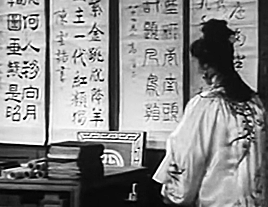

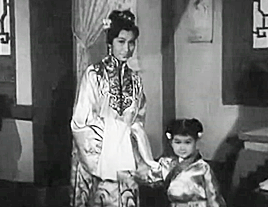
Five Days of Yam-Pak Movies ~ Bonus: Madam Yun // 芸娘 (dir. Chu Kea/珠璣, 1960) - starring Yam Kim Fai (任劍輝) and Pak Suet Sin (白雪仙)
Click below for more information + some commentary!
Outline & Scene Summary
Inspired by Shen Fu/沈復's Qing Dynasty autobiography Six Records of a Floating Life/浮生六記. Madam Yun focuses on Shen Fu (Yam Kim Fai) and his wife Yun (Pak Suet Sin), who live in married bliss with their children at the former’s familial home. However, they fall foul of the machinations of Shen Fu’s younger half-brother, who has designs on the inheritance, and are summarily kicked out. The young family struggle to adjust to their poverty, but their plight is worsened by Yun becoming chronically ill; these desperate straits result in Shen Fu having to leave his family behind in search of paying work. Thankfully, after all his efforts he is able to find a benefactor, and the family is reunited under one roof (which is, sadly, not what happened in real life).
In this early scene depicting the calm before storm, Shen Fu is trying to write a poem, but struggles to find the right words to finish off a line. As he is musing, his wife sneaks up and writes in her own suggestion, delighting him with her scholarly wit.
Although the movie as a whole is pretty dour, the first few scenes really stood out to me as a lovely (if inadvertent) depiction of an F/F couple being happily married with children, especially as Pak’s character is not reduced to being a mere mother or housewife, and the focus remains on the love between the pair. It’s also notable that the source material is known for being a rare depiction of a loving marriage in Chinese literature, and the earlier 1954 film adaptation specifically cast two actors who frequently played married couples (namely Cheung Wood-Yau/張活游 and Pak Yin/白燕; see source). The casting of Yam-Pak for this movie indicates that the studio was confident the public would embrace them as not only a romantic pairing, but specifically the ideal of a married couple.
Note: Six Records of a Floating Life is very much worth reading, not only because it's a vividly-drawn portrait of everyday life in 19th-century China (floral arrangements! exam LARPing! complaining about how touristy Hangzhou's West Lake is!), but also because it contains queer elements. There are references to Yun having a relationship with another woman (and asking her husband to take her on as a concubine, lol) and being attracted to other women, none of which are mentioned in this movie.
Links:
My post about Yam Kim Fai and Pak Suet Sin being queer icons
Full movie on Youtube
#hong kong#hong kong film#hong kong movie#hong kong cinema#cantonese opera#chinese opera#yam kim fai#pak suet sin#yampak#yambak#任白#任劍輝#白雪仙#pak sheut sin#bak sheut sin#theatre#my gifs#芸娘#madam yun#浮生六記#six records of a floating life#happy cny eve to all who celebrate!
7 notes
·
View notes
Text
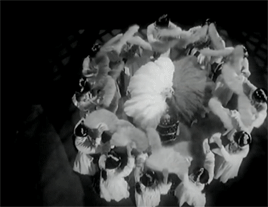
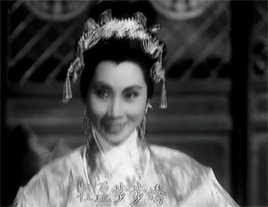

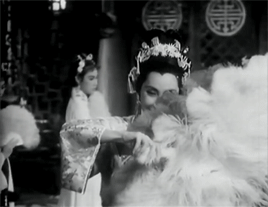
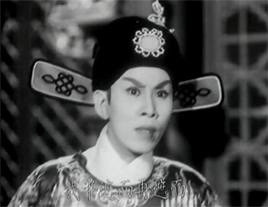
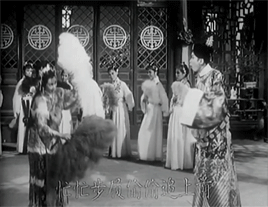
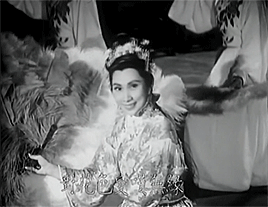
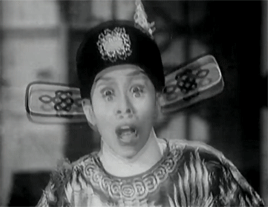
Five Days of Yam-Pak Movies ~ Day 5: Butterfly and Red Pear Blossom // 蝶影紅梨記 (dir. Lee Tit / 李鐵, 1959) ~ Final Scene: 紅梨復艷 - starring Pak Suet Sin (白雪仙) and Yam Kim Fai (任劍輝)
Scene outline and more information below!
Final Scene: The Red Pear Tree Blossoms Again // 紅梨復艷
After many trials and tribuations, courtesan So-chau (Pak Suet Sin) is finally able to reunuite with her lover Chiu Yu-chau (Yam Kim Fai). However, Chiu – a newly-appointed magistrate tasked with eliminating corruption – is determined not to enjoy the festivities, especially as he believes So-chau to be dead. Eventually, So-chau succeeds in drawing his attention, but Chiu is shocked to see her standing before him, and immediately assumes that she is a ghost (there are story reasons for this, but it’s still funny to see). Thankfully, the misunderstandings are quickly cleared up and the pair have their happily ever-after-after.
Note: The English title is a very loose interpretation of the original title of the scene, which would be more literally translated as “The Red Pear Blossom Returns to its Full Glory”. Also, the scene summary is not entirely accurate because it would take far too long to go into the exact details… this film has quite a few twists and turns XP
Links:
My post about Yam Kim Fai and Pak Suet Sin being queer icons
My summary of the film
Clip of this scene on Youtube
Full film on Youtube
#hong kong#hong kong film#hong kong movies#hong kong cinema#cantonese opera#chinese opera#yam kim fai#pak suet sin#yampak#yambak#pak sheut sin#bak sheut sin#theatre#蝶影紅梨記#butterfly and red pear blossom#my gifs
5 notes
·
View notes
Text
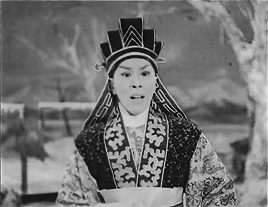
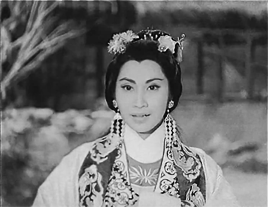
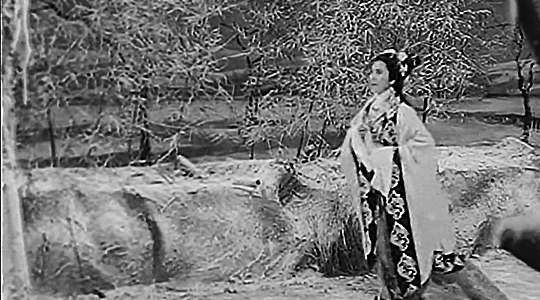
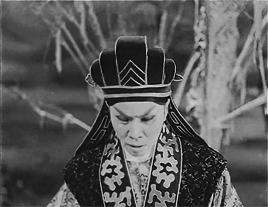
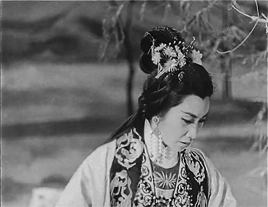
Five Days of Yam-Pak Movies ~ Day 4: Xi Shi, The Eternal Beauty // 西施 (dir. Chu Kea / 珠璣, 1960) - starring Yam Kim Fai (任劍輝) and Pak Suet Sin (白雪仙)
Scene outline and more information below!
Outline
Based on the folk tales surrounding Xi Shi, one of the Four Great Beauties (四大美女) of China. The Yue Kingdom has been conquered by the warmongering Wu Kingdom, and its king and queen have been taken hostage. In a bid to rescue the monarch and turn the tables, minister Fan Li (Yam Kim Fai) recruits the humble but politically-minded washerwoman Xi Shi (Pak Suet Sin) and trains her up to become the king of Wu’s concubine— in other words, their woman on the inside. Both fall for each other, but love their country too much to call off the mission, so Xi Shi enters the Wu Kingdom’s court as originally planned. And it turns out that she is naturally gifted as a saboteur: drawn in by her beauty and constantly turned around by her cleverness, the king of Wu soon becomes a puppet dancing to the tune of Yue’s liberation…
Scene Summary
Although Xi Shi is an excellent spy, that’s not to say that she does not face her own share of troubles. She is isolated, having no compatriots apart from another concubine sent with her from Yue Kingdom, and not knowing when she can see her love next; and of course, there is also a very high chance of her dying in the Wu Kingdom even if she succeeds in causing its ruin. In this scene, Xi Shi has spent some time at the Wu court and so is elated to see a visiting Fan Li – however, both are filled with mixed emotions, knowing that their reunion is only temporary and that they cannot allow their feelings to jeopardise the mission.
What’s great about Xi Shi, The Eternal Beauty is that it’s basically a spy movie in a period setting. Sure, Xi Shi is beautiful, but the emphasis is on her being hyper-competent and highly intelligent; even when the king of Wu and his advisors are suspicious of her, she’s able to run circles around them. And despite it being a honey trap, there’s no threat of sexual assault or sexual violence at all! Thanks to the censorship of the 1950’s, the king of Wu is reinterpreted as just someone who really likes watching (non-sexualised) dance performances. It’s a novel take on Xi Shi, as most tellings depict her as being a passive pawn, whether as a helpless woman whose body is exploited in the conflict between Yue and Wu, or as someone who manages to ruin a kingdom purely by dint of being so beautiful that the ruler cannot focus on his duties. Take a look the essay linked below, and marvel at how much better this movie is!
Links:
My post about Yam Kim Fai and Pak Suet Sin being queer icons
An English-language academic essay by HKU professor Olivia Milburn on the depictions on Xi Shi in early Chinese literature
Full movie on Youtube
#hong kong#hong kong film#hong kong movie#hong kong cinema#cantonese opera#chinese opera#yam kim fai#pak suet sin#yampak#yambak#pak sheut sin#bak sheut sin#theatre#my gifs#西施 1960#xi shi 1960#xi shi the eternal beauty#xi shi
5 notes
·
View notes
Text
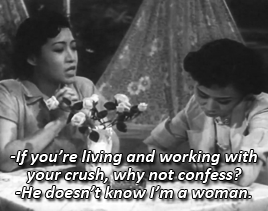




Five Days of Yam-Pak Movies ~ Day 3: Lovesick // 為情顛倒 (dir. Chiang Wai-Kwong/蔣偉光, 1952) - starring Yam Kim Fai (任劍輝) and Pak Suet Sin (白雪仙)
Commentary below the cut!
Summary
The daughter of a shipping tycoon, Yam Ming Fai (Yam Kim Fai) runs the family business in Hong Kong while pretending to be a man, but dreams of being able to marry her male subordinate. Unfortunately for her, she finds out that he is already dating someone, a small-time singer named Chan Ping Sin (Pak Suet Sin). What else is a girl to do but try to seduce her crush’s girlfriend, to force them to break up? (Many things, surely, but the multitude of other options do not occur to Ming Fai.) But while Ming Fai wins the battle, she loses the war, because although Ping Sin falls for her, her crush gets engaged to another woman instead. There is also a subplot about a working-class couple who want to get married despite their parents’ disapproval, which feels almost like a whole separate movie folded into this one.
Despite the inevitably conservative ending, it’s a fun watch, made funnier by how the movie seems to wink at the audience with regard to the queer elements. At the start, the script has Ming Fai assert both her heterosexuality and gender-conformity to a female friend, but in the film itself Yam is bursting with a cheeky charm not found in her other characters, who are generally rather staid and earnest. There’s also a heavy emphasis on the flirting with Pak’s character, and there are multiple instances of Ming Fai boasting to her male crush about winning Ping Sin’s affections – supposedly to make him jealous, but she seems far too gleeful for this to be the case. Ping Sin herself is also an interesting case; there’s a large contrast between her harsh, dismissive treatment of her boyfriend and her sweet attitude towards Ming Fai throughout, which subtly undermines the ending wherein she returns to the former. And it would be remiss not to add that yes, the character names are definitely riffing on the actors’ names – “Yam Ming Fai” and a lot of the other characters’ names are obvious enough, but even the “Chan” in “Chan Ping Sin” comes from Pak Suet Sin’s real name, Chan Suk Leung/陳淑良. Make of that what you will.
Note: Sadly, this is the only extant film wherein Yam plays a female character who is romantically linked with Pak’s character in some way; copies no longer seem to exist for the five other examples, namely Lucky Strike/福至心靈 (1951), Stage-Fans’ Sweetheart/戲迷情人 (1952), Two Naughty Girls/一對胭脂馬 (1952), Love Affairs of the Opera Master/伶王艷史 (1953), The Clumsy Lover/糊塗脂粉客 (1953).
Links:
My post about Yam Kim Fai and Pak Suet Sin being queer icons
Full movie on Bilibili
#hong kong#hong kong film#hong kong movies#hong kong cinema#yam kim fai#pak suet sin#yampak#yambak#pak sheut sin#bak sheut sin#my gifs#five days of yam-pak#lovesick 1952#為情顛倒#wlw recommendations
6 notes
·
View notes
Text


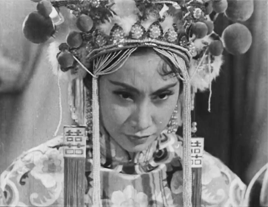


Five Days of Yam-Pak Movies ~ Day 2: Triennial Mourning on the Bridge // 三年一哭二郎橋 (dir. Yu Leung/俞亮, 1959) - starring Yam Kim Fai (任劍輝) and Pak Suet Sin (白雪仙)
Scene summary and more information below!
Outline & Commentary
Triennial Mourning on the Bridge concerns two brothers who are very close: older brother Yiu Cho dotes on younger brother Tse Cho (Yam Kim Fai), and in turn the latter does his best to return such kindness. But the relationship is tested for the first time when the younger brother discovers that his older brother is – by an unfortunate twist in fate – unknowingly marrying his own sweetheart Chun Heung (Pak Suet Sin), whom he lost contact with after the outbreak of war, and who was sold into marriage by her mother.
This is a movie with some real ups and downs. The start is pretty slow going, as it introduces you to the two lovebirds, outlines the good relationship between the two brothers, then skips ahead to focus on Chun Heung and her mother’s life after the war. And then it hits you with this incredible scene, this wedding where the two sweethearts meet again after many years, but Chun Heung has been locked into a union she doesn’t want, and Tse Cho loves his brother too much to ruin his marriage. This gifset really does not do it justice, especially as I had to cut the fifth GIF short to fit the size requirements, so please do watch the scene in full (it starts 27 minutes in)!
Links:
My post about Yam Kim Fai and Pak Suet Sin being queer icons
Full movie on Bilibili
#hong kong#hong kong film#hong kong movie#hong kong cinema#cantonese opera#chinese opera#yam kim fai#pak suet sin#yampak#yambak#pak sheut sin#bak sheut sin#theatre#my gifs#five days of yam-pak
5 notes
·
View notes
Text



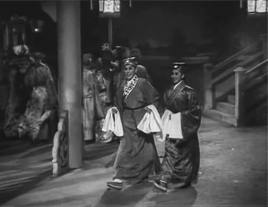

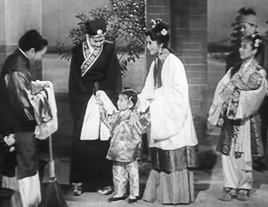
Five Days of Yam-Pak Movies ~ Day 1: Madam Yun // 芸娘 (dir. Chu Kea / 珠璣, 1960) - starring Yam Kim Fai (任劍輝) and Pak Suet Sin (白雪仙)
Summary and more information under the cut!
Summary
Inspired by Shen Fu/沈復's Qing Dynasty autobiography Six Records of a Floating Life/浮生六記. Madam Yun focuses on Shen Fu (Yam Kim Fai) and his wife Yun (Pak Suet Sin), who live in married bliss with their children at the former’s familial home. However, they fall foul of the machinations of Shen Fu’s younger half-brother, who has designs on the inheritance, and are summarily kicked out. The young family struggle to adjust to their poverty, but their plight is worsened by Yun becoming chronically ill; these desperate straits result in Shen Fu having to leave his family behind in search of paying work. Thankfully, after all his efforts he is able to find a benefactor, and the family is reunited under one roof (which is, sadly, not what happened in real life).
Links:
My post about Yam Kim Fai and Pak Suet Sin being queer icons
Full movie on YouTube
#five days of yam-pak#in honour of 任姐's birthday#yes i learned to make gifs for this#hong kong#hong kong film#hong kong movie#hong kong cinema#cantonese opera#chinese opera#yam kim fai#pak suet sin#yampak#yambak#pak sheut sin#bak sheut sin#theatre#my gifs#芸娘#madam yun#浮生六記#six records of a floating life#btw these are all from the first 20 mins as it goes downhill after that#just tears tears tears all the way down#though it's got a happy ending#unlike the original book
5 notes
·
View notes
Text
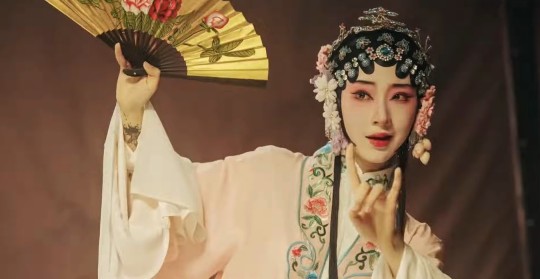



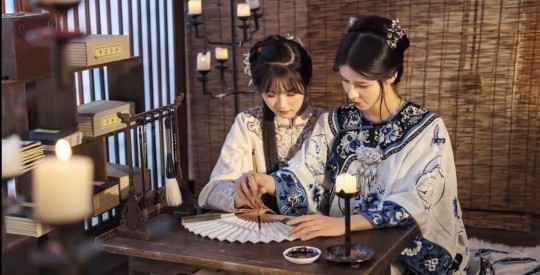
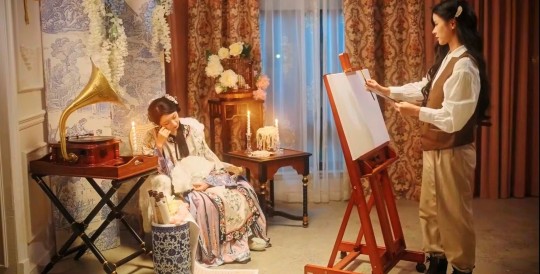
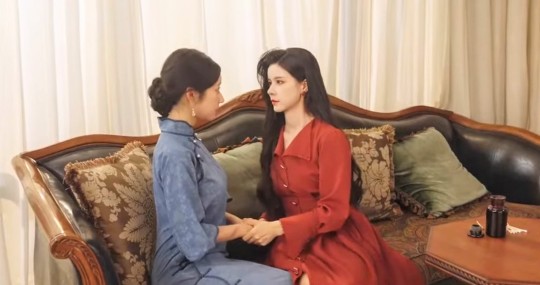
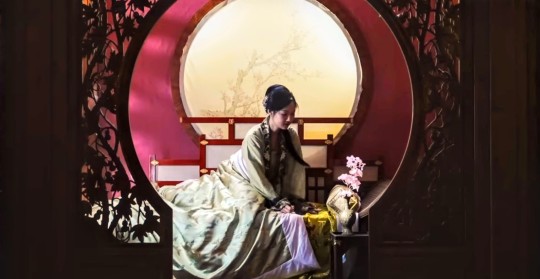
Chinese GL Webseries & Shorts for the Wuxia-Uninclined
Have you ever wanted to venture into the world of Chinese GL webseries and short films, only to find yourself at a loss about where to begin, or intimidated by the unfamiliar tropes and terms of the wuxia genre?
Well, worry no more! Here's a selection of non-wuxia webseries and short films curated by yours truly. Now you too can enjoy the lavish costumes and location shoots of these Chinese productions, so rarely seen in F/F works outside of feature films and the occasional TV series~
By the way, these are all translated and subbed by the inimitable Douqi (@douqi7s), whose immense contribution to the English-language baihe fandom is surely in breach of anti-monopoly laws. Offer up your thanks at her Tumblr and Twitter!
At-a-glance list
Webseries:
Ye-Mu Season 2 (1 hr 20m total, 2023) - standalone
The Vampires (41m total, 2022)
Ye-Mu Season 1 (27m total, 2022) - standalone
The Lost World (1hr 5m total, 2023)
Short films - order corresponding to the pictures above:
A Tale of Yearning (5 mins, 2022)
"She Brought Colour Into My World" (2.5 mins, 2023)
"I'm Her Weapon" (3 mins, 2022)
Miss Shen and the Woman Warlord (6 mins, 2023)
Women's Script (5 mins, 2023)
The Caged Canary (5 mins, 2023)
The Beauty of the Law (6 mins, 2023)
Flowers Bloom; Flowers Wither (9 mins, 2022)
Commentary under the cut!
FYI, I've opted to link directly to the subtitled versions since they're probably more difficult to find than regular anime, TV series, movies etc. If a link is broken, please refer to Douqi's blog directly.
Important note for the uninitiated:
It’s a bit difficult to talk about canonicity in relation to live-action works made in the PRC, as things which would normally be used as evidence of canonicity all fall under the censorship regulations— explicit references to romantic relationships or queerness, declarations of love, kissing etc. are all off the table. So while these may not look canon in the most traditional sense, they are intended to be read as such and should certainly not be dismissed as queerbaiting or yuribait. Also, the creators can get very imaginative, so this is less of a problem than you may think – see the entries on Ye-Mu Season 2 and The Lost World in particular!
1. Ye-Mu Season 2 / 叶穆 2 (32 episodes / 1hr 20m total, 2023, dir. Zhang Zhiwei) - MyDramaList
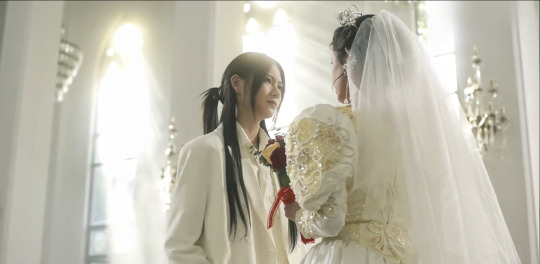
(Note: Despite the name, Ye-Mu Season 2 is completely unrelated to the first season; the only thing the two share is the cast, crew, and focus on Penthouse-style melodrama.)
Determined to take revenge for her mother's death, Xu Baiqing (Sheng Wei) marries a wealthy and much older businessman in the hope of finding evidence to put him behind bars. But first she must assuage the suspicions of his cheerily hostile second daughter, moody youngest son, and estranged eldest daughter (Ye-Mu Zhixia, played by Wang Laoji), the latter of whom Xu Baiqing dated in university and who is currently seething at the sight of her former girlfriend marrying her father...
If you want to get a sense of the potential breadth of Chinese GL webseries, this is a pretty good place to start. It does a decent job of matching the tone and presentation of a melodrama you might catch on TV (and in fact looks higher-budget than some I can think of), while committing to something that can’t be done on TV yet— namely, featuring an F/F exes-to-stepmother storyline and delivering on the drama inherent in such a premise. Of particular note is how the framing and behaviour of Ye-Mu Zhixia is very much consistent with that of a male romantic lead; thanks to some clever writing, it’s basically impossible to deny the nature of her relationship with the main character. They don’t even lean on the plausible deniability afforded by the label of “friendship”— in fact, in an early scene she is incensed when the protagonist refers to her as “[her] only friend”. There are a few caveats – the main character ends up in a lot of scrapes that her ex-girlfriend has to save her from, the reveals are often rather unsurprising, and the story shifts more to a mystery focus around halfway – but it’s still worth checking out if a Korean-style melodrama with an F/F take on a romantic storyline sounds appealing.
(CW: violence, murder, attempted sexual assault)
Note: See The Lost World (below), from the same creative team, for an even more impressive example of Chinese GL pushing the limits of censorship.
Links: MEGA / Internet Archive (compilation)
2. The Vampires / 吸血鬼鬼盲盒 (7 episodes / 41m total, 2022, dir. Zhang Zhiwei) - MyDramaList
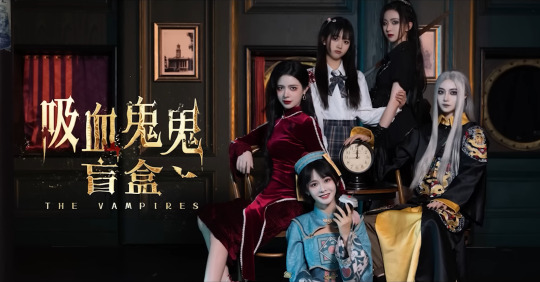
(Note: Spoilers for the first 15 minutes or so, because otherwise the summary would be “They end up locked inside with the monsters on board”, which wouldn’t tell you much more than the title already does)
Every night, Tianyue (Ye Miao/夜喵) has been having dreams about the mysterious cruise ship docked at the pier. Convinced that there is treasure hidden inside, she and her exorcist-cultivator girlfriend Xiao Ling (Wei Miao/微渺) sneak on board only to find that they are trapped there until the sun comes up. Things don’t seem too bad at first: although they run into two vampires – the cute, cheeky Xingming (Yang Fuyu) and her elegant mistress Su Tanya (Sheng Wei) – they are able to call a truce, on the condition that the humans help search the ship for the latter’s beloved (Fu Cha, played by Wang Laoji). But when Fu Cha wakes up without her memories, it is clear that something is terribly wrong, and that the ship and its inhabitants harbour more secrets than expected.
For a webseries, The Vampires takes a while to get started— it’s a bit difficult to tell what kind of story or indeed what kind of tone it’s going for just based on the somewhat campy and comedic first section. But after that wobbly beginning, it manages to pull itself together to tell a compelling – and sometimes genuinely tense – tale about a motley band of humans and vampires, and the truths they have to face together. While the ending is no happily-ever-after, I found it satisfying and hopeful, and surprisingly affecting. Also, a bunch of the characters have real polyam energy, and this is reflected in the narrative beyond mere flirting!
(CW: abusive parents)
Links - MEGA / Internet Archive (compilation) / YouTube (compilation)
3. Ye-Mu Season 1 / 叶穆 (12 episodes / 27m total, 2022, dir. Zhang Zhiwei) - MyDramaList
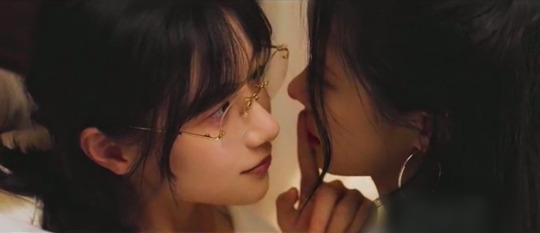
(Note: Ye-Mu Seasons 1 and 2 are standalone stories; each season is entirely self-contained and the second season is not a continuation of the first.)
The head of the Ye-Mu family has died, leaving the next generation to squabble over the inheritance. It's a web of secrets, lies, and hidden resentments, as the characters dig out old grievances and fresh accusations in a desperate attempt to one-up each other. They're tangled up together to an almost incestuous degree, and indeed, the F/F subtext here is the ambiguous relationship between eldest daughter Ye-Mu Nanzhu (Sheng Wei) and second daughter Ye-Mu Nanmo (Wang Laoji) (rest assured that they are at least not biologically related).
Those who prefer darker stories and don't mind the pseudo-incest or other content warnings will find a melodrama which makes good use of its short runtime to deliver on twists, turns, and an explosive - if tragic - conclusion. That being said, the story is about the family drama in general, so do note that while the relationship between Nanzhu and Nanmo is narratively important, it is not fleshed out in great detail and certainly not the focus of the series.
(CW: suicide, ableist trope (spoiler – disabled character turns out to have been faking it), ableist language)
Links - MEGA / Internet Archive (compilation)
4. The Lost World / 夏夜知道风的甜 (1hr 5m total, 2023, dir. Zhang Zhiwei) - MyDramaList

(Note: Spoilers for the purpose of flagging triggering content, as it’s particularly easy to trip into for this show. Also, some vague spoilers for later episodes in order to highlight in order to highlight the themes etc.)
This webseries feels like two shows smushed into one: apart from the very beginning, the first half is a gritty, bullying-focused take on university life, while the second is a true-blue romantic comedy (aside from one blip – see the note below for details). But even if you’re wary of the bullying, I would still recommend watching the back half – which is basically standalone – as it’s a very funny and heartfelt story about two childhood friends finally getting their act together. Without further ado, here’s two blurbs!
From episode 1 onwards: After saving a classmate from the class bully, popular college student Xia Huaichu (Yang Fuyu) is subjected to a lengthy harassment campaign by the latter. She is suddenly faced with having to protect her reputation in the face of false allegations and fake nudes– despite the fact that all she wants to do is focus on reconciling with another classmate, a high school best friend whom she had previously lost touch with (Mu Qingfeng, played by Wang Laoji).
From episode 14 onwards: Childhood friends Xia Huaichu (Yang Fuyu) and Mu Qingfeng (Wang Laoji) are caught in a weird gay purgatory where each has feelings for the other, and suspects that the other has feelings for them too. But both are exceedingly stubborn and want the other one to take the initiative in confessing, leading to ridiculous displays of I-don’t-care-isms and lots and lots of UST. (Does anybody use that term anymore??)
As you may have guessed, I’m not too keen on the first part of this show, nor the decidedly unnecessary attempted rape segment, though that’s partly on me for not checking the content warnings beforehand. And yet I’m very glad to have stuck with it, because the second half is not only hilarious, but also a masterclass in censorship-dodging that needs to be seen to be believed. Not just in terms of the suggestive scenes, of which there are many, either— the story is literally about two women starting a relationship and having to reckon with parental disapproval, homophobia, and other obstacles which platonic friends wouldn’t have to deal with. I honestly don’t know how this ever got approved, and can only applaud. Bravo.
Note: For those who want to avoid the triggering content, I’d recommend starting at episode 14, but make sure to skip episodes 19 and 20 as there is a foiled rape attempt.
(CW for entire series: bullying (incl. violence, fake nudes), sexual harassment, attempted sexual assault, fatphobic language, homophobia
CW for episodes 14-24: attempted sexual assault in episodes 19-20, homophobia)
Links - MEGA / Dropbox
SHORT FILMS

Quick note: Click on the English titles for the subtitled versions, and the Chinese titles (which are really just the video titles) for the originals. And yes, although the majority of these are shampoo commercials, they really do hold up as short films in their own right. Give them a try, you might be surprised!
A Tale of Yearning / 一见误终生,不见终生误 (5 mins, 2022, dir. Liu Yun Rui/流云蕊) – A bittersweet story about a literature-minded young woman (Sheng Wei) and a Chinese opera performer (Ai Ye) who bond over their love of fiction, only to be torn apart by harsh reality. Tragic ending, but I liked the more literary turn of the dialogue. Shampoo ad. (CW: homophobia)
“She Brought Colour Into My World” / “她走后,我的世界又失去了颜色” (2.5 mins, 2023, dir. Zou Hui Qu Le/走回去了) – A very restrained short film (actually, more like a music video) set during the late Qing era, wherein a sheltered young woman (Xiao Yu Za/小宇咂) falls for her female neighbour, recently returned from studying abroad (Sheng Wei). Lovely use of music and visuals to create a dreamlike atmosphere. Tragic ending. Not a shampoo ad.
“I’m Her Weapon” / 我是你手里的一把刀 (3 mins, 2022, dir. Liu Yun Rui/流云蕊) – A moody, interior piece about an assassin (Ai Ye) who yearns for some sign of affection from her handler (Sheng Wei), only to be left devastated by her new assignment. Surprisingly not a shampoo ad.
Miss Shen and the Woman Warlord / 我们是孤独行走的钟,但也要做敲响希望的钟 (6 mins, 2023, dir. Liu Yun Rui/流云蕊) – I’d like to describe this as being inspired by the story of Mai Jia’s novel The Message and the aesthetics of Kawashima Yoshiko (1990), but most Tumblr users would probably find those references deeply unhelpful. Basically, a female spy (Sheng Wei) disguises herself as a male soldier and infiltrates the mansion of a Republican warlord. There, she meets the warlord’s daughter (Ai Ye), who quickly realises that there is more to the promising young officer than meets the eye. Shampoo ad.
Women’s Script / 纵使“科考”无女子,无碍红袖书香,星辰有光 (5 mins, 2023, dir. Liu Yun Rui/流云蕊) – While sailing down a river, a girl (Zhi Chun He/至春禾) catches sight of a woman writing poetry on the riverbank (Sheng Wei), and is fascinated by both her beauty and her flaunting of the rules against women’s literacy. Shampoo ad. (CW: domestic violence)
The Caged Canary / 如果这是一场骗局,那我也只愿意输给你 (5 mins, 2023, dir. Liu Yun Rui/流云蕊) – The protagonist (Ai Ye) is sent by her parents to beguile a wealthy young man into marriage, but ends up developing feelings for his modern-woman sister (Sheng Wei) instead. Shampoo ad. (CW: attempted sexual assault)
Flowers Bloom; Flowers Wither / 她们一个被铁链禁锢,一个被男装束缚,直到救赎彼此 (9 mins, 2022, dir. Qian Li Min/千里明) – Takes the romance between a cross-dressing noblewoman (Du Ruo/杜若) and her supposedly-mad stepmother (Rou Lian Cheng/肉脸橙) to tell a story about the restrictions placed on women in historical times, and how resistance, even when futile, can still have meaning. Tragic ending, obviously. Not a shampoo ad. (CW: domestic violence, misogyny, accidental misgendering, gender dysphoria)
#sapphic#lesbian#gay#wlw#baihe#chinese gl#yuri#gl series#wlw series#short films#wlw recommendations#ye mu#wicked wealthy women#the vampires 2022#the lost world 2023#xia ye zhi dao feng zhi tian#zhang zhiwei#liu yun rui#wang laoji#wang xuexi#sheng wei#yang fuyu#ai ye#list
217 notes
·
View notes
Text
Some WLW (?) Jdrama & Kdrama recommendations!
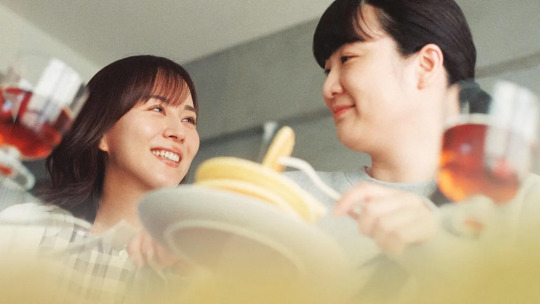
Jdramas and Kdramas have a (not-entirely-unearned) reputation for being very straight, but here are a few which are either canonically F/F or which prominently feature a female-female pair-- please enjoy! For those who enjoy following series in real time, Chaser Game W and She Loves to Cook, and She Loves to Eat S2 are both airing this January 2024 :)
As with my post on anime with yuri subtext, since subtext is so subjective, this list only includes series which I’ve actually watched, and so is by no means intended to be comprehensive. Also, it doesn't include any webseries, since those probably deserve a post of their own.
At-a-glance list:
Miss Sherlock (8 episodes, 2018) (subtext)
Night Light (20 episodes, 2016) (subtext)
Tokusatsu Gagaga (7 episodes, 2019) (subtext)
Painter of the Wind (20 episodes, 2008) (canon?)
She Loves to Cook, and She Loves to Eat (10 15-minute episodes and counting, 2022~) (canon)
Sono Toki, Heart wa Nusumareta (5 episodes, 1992) (canon)
Chaser Game W (10? 30-minute episodes, 2024) (canon)
Doctor X (7 seasons and counting, 2012~) (subtext)
Bonus: SKY Castle (20 episodes, 2018) (subtext)
Summaries under the cut!
1. Miss Sherlock / ミス・シャーロック (8 episodes, 2018) (subtext) – MyDramaList | AsianWiki
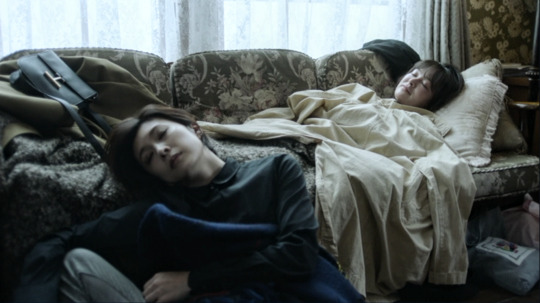
The elevator pitch for this show is simple: it’s Sherlock Holmes, but where Holmes and Watson – here named “Sherlock” and Tachibana Wato, and played by Takeuchi Yuko and Kanjiya Shihori, respectively – are both female, and the cases are all set in modern Tokyo. As with other adaptations, mystery-solving and the budding relationship between the two leads takes centre stage, but Miss Sherlock manages to carve out an identity all its own.
There’s a calm beauty to its visuals, which favour sunlight and urban greenery, and the show’s focus on former doctor Wato as she tries out new jobs and goes to therapy means that there’s a surprisingly high number of slice-of-life scenes. It’s also subtly more female-focused than the source material; Sherlock’s gossipy but good-natured landlady Ms. Hatano (Ito Ran) is as much a member of the household as Sherlock and Wato, and the cases often revolve around female characters. But more than anything, it’s just really fun to watch Sherlock and Wato’s relationship bloom as they snip and snipe and are utterly unable to stay out of each other’s space (literally – the body language and blocking is *chef’s kiss*). Their relationship is the heart of the show – watch this one until the end, you won’t regret it!
(CW: psychological abuse, manipulation, and genre-typical murder, violence, and gore)
2. Night Light / 불야성 (20 episodes, 2016) (subtext) - MyDramaList | AsianWiki
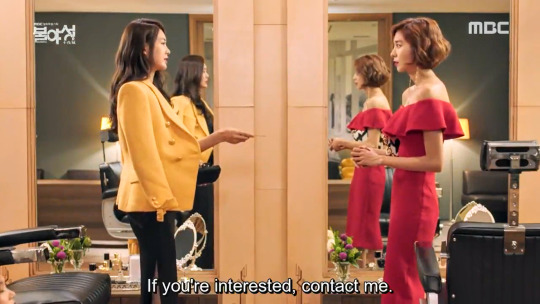
(Note: spoilers for the mid-season twist, but it’s impossible to allude to a good portion of the F/F subtext without doing so, and I think knowing the twist ahead of time doesn’t make it any less enjoyable.)
Night Light is a rather odd show. It’s simple enough on the face of it, a story about successful but ruthless CEO Seo Yi-kyung (an icy Lee Yo-won) who tries to mold the younger Lee Se-jin (a puppy-eyed Uee) in her own ambitious image, only for her protege to develop the conscience she never had and move to stop her dastardly plans… but upon watching it’s a totally different creature, thanks to the alchemic reactions of some delightfully contradictory acting choices (Uee’s performance convinces viewers less of Se-jin’s supposed latent desire for power and money, and more of a deep love and devotion for the CEO) and the unintentionally (?) inneundo-laden script (“If I like something once, I never forget it– whether it’s a dress… or a person,” declares the CEO less than ten minutes into the first episode while gazing intently at Se-jin).
Honestly, it’s a wonder this series ever got made, but you certainly won’t see me complaining! The first part is full of boss/subordinate goodness; Se-jin is unable to resist the CEO’s magnetic pull despite her hot-and-cold behaviour, while the CEO cannot bring herself to push Se-jin away completely. And then, when Se-jin makes her mind up to stop the CEO, it morphs into a corporate take on a (subtextual) lovers-on-opposite-sides situation, where it is precisely Se-jin’s feelings for the CEO that motivate her to stop her. In short, it’s a workplace GL fan’s dream.
Note: If you do watch it, skip the corporate politicking cutscenes with the old men, you’ll thank me later. Also, there’s a prominent male character who is the CEO’s ex and who works closely with Se-jin in the second half, but don’t worry, all the M/F romance is in the past (and doesn’t get much screentime)– he and Se-jin aren’t interested in each other at all.
3. Tokusatsu Gagaga / トクサツガガガ (7 episodes, 2019) (subtext) - MyDramaList | AsianWiki

Nakamura Kano (Koshiba Fuka) lives and breathes tokusatsu shows (think Power Rangers, if you’re not familiar), but keeps it a secret from her work colleagues to avoid being shunned or laughed at. And yet she yearns for connection, so when she sees a woman on the subway bearing a keychain from her favourite show (Yoshida Hisami, played by Kurashina Kana), she is determined to find her again.
Although ostensibly about being a tokusatsu fan as an adult, this show is rife with queer subtext, and not in the usual way. It deals with the difficulties of staying in the closet (regarding being an adult tokusatsu fan), the desire to connect with other queer people adult tokusatsu fans and how one might do so through hints and signals, parental disapproval arising from gendered and social expectations (that tokusatsu shows are for boys, and magical girl shows for girls), intersectionality and finding comradeship with other minorities people who are excluded due to their interests, and even generational gaps wherein younger queers fans may underestimate the obstacles that still exist. Although all that might sound a bit stressful, it isn’t actually! Difficult incidents are handled with sympathy and a dash of wry humour, and the show never loses sight of the fact that it – above all else – is a story about finding queer community in the face of a heteronormative hostile world, told with warmth and the nuance of lived experience.
4. Painter of the Wind / 바람의 화원 (20 episodes, 2008) (canon?) - MyDramaList | AsianWiki
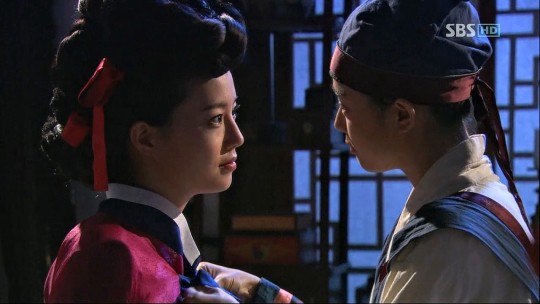
Adapting the novel of the same name by Lee Jung-myung, Painter of the Wind takes as its protagonist a gender-bent version of real-life Joseon-era painter Shin Yun-bok (Moon Geun-young), whose paintings are used to weave a tale of artistry, political intrigue, and romance, and more than anything else to offer modern-day viewers a glimpse of everyday life in 18th-century Korea.
While it may sound like Dickinson’s boring cousin, apart from having a common preoccupation with reframing historical works, another similarity the two shows share is that Painter of the Wind is also very gay. Starting from the first episode, Yun-bok meets and becomes fascinated by the courtesan Jung-hyang (Moon Chae-won), who despite her initial aloofness is drawn to Yun-bok’s intellect and sensitive demeanour. It’s a real meeting of the minds, their witty repartee in early episodes reminiscent of Twelfth Night’s Viola and Olivia, and their relationship isn’t siloed off from the main plot either: Yun-bok’s infatuation quickly starts causing issues with her academic career, and the two eventually have to contend with Jung-hyang’s precarious position as a courtesan as well.
Unfortunately, all this is undermined in the back half of the show, which tries to gaslight viewers into thinking that Yun-bok’s feelings for Jung-hyang were purely platonic all along and that she totally has romantic feelings for her much older male mentor— but hey, at least it’s an open ending. Despite everything, though, I can’t think of another serious historical TV show which features such a prominent F/F narrative for its main character, even nearly two decades later. (Let me know if you have any others! And no, Gentleman Jack doesn’t count, it’s not exactly traditional in style!)
(CW: period-typical sexism)
5. She Loves to Cook, and She Loves to Eat / 作りたい女と食べたい女 (10 15-minute episodes and counting, 2022~) (canon) - MyDramaList

Based on Yuzaki Sakaomi’s manga of the same name, this simple but sweet show follows home-cooking extraordinaire Nomoto Yuki (Higa Manami), who yearns to cook large-scale dishes but doesn’t eat enough to justify making them. Luckily for her, her neighbour Kasuga Totoko (Nishino Emi) has a massive appetite!
It’s always lovely to see more grounded stories about working women, especially when they’re as cute as this one. Though it touches upon some slightly more serious issues, such as with regard to gendered expectations surrounding food and cooking, it’s primarily a feel-good slice-of-life show about two women getting to know each other by cooking and eating delicious food together.
Side note: if you’ve started it and think the show doesn’t look cosy enough, stick it out for a few more episodes, the production values improve after the first part! Also, the series was renewed for a second season with double the episode count (for a total of 20 episodes) which will start airing on January 29th this year, so this is the perfect time to jump in!
6. Sono Toki, Heart wa Nusumareta / その時、ハートは盗まれた (5 episodes, 1992) (canon) - MyDramaList
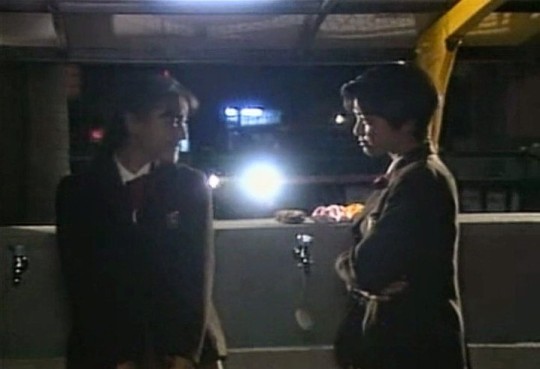
Sono Heart, as it’s nicknamed, starts off as a typical heteronormative high school romance: bumbling protagonist Shiina Hiroko (Isshiki Sae) is desperate to get closer to her crush Katase Masato (Kimura Takuya), star of the school basketball team and all-round nice dude. However, a spanner in the works comes slouching along in the form of female classmate Aso Saki (Uchida Yuki, in her debut role), a mischievous, short-haired personification of trouble who Katase turns out to have feelings for. One day, Hiroko gets into a fight with Saki, and they end up having to stay together after school as punishment. But that afternoon gives them the opportunity to bond over a heart-to-heart conversation, and things seem to improve… until, just before leaving, Saki kisses Hiroko. And then everything changes.
Or rather, everything changes eventually. What’s great about this show is that it doesn’t take shortcuts: Hiroko doesn’t instantly fall in love with Saki. Instead, what you get is a surprisingly layered portrait of a high school girl whose coming to terms with queerness is merely a natural extension of reckoning with her burgeoning sexuality. And, because Saki is self-destructive in her depression and makes a game of belittling, worrying, and infuriating anyone who cares about her, it’s really a story about what it means to love another person rather than a romantic ideal. A word of warning, though: Katase is actually quite a large character, as he and Hiroko end up becoming friends. Also, the ending is very abrupt and inconclusive, though rest assured that it doesn’t try to roll back Hiroko’s feelings, or pair either girl off with a guy.
(CW: self-harm, attempted suicide, bullying, homophobia, underage drinking)
7. Chaser Game W: Power Harassment Boss Is My Ex-Girlfriend / チェイサーゲームW: パワハラ上司は私の元カノ (10? 30-minute episodes, 2024) (canon) - MyDramaList | AsianWiki
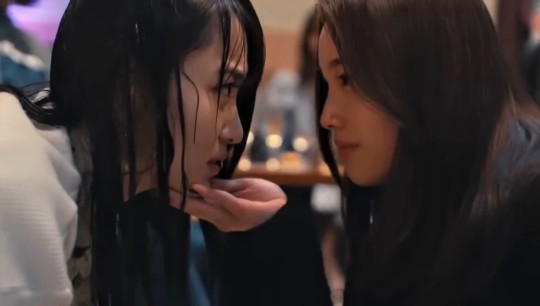
Probably jumping the gun here as only two episodes have aired as of writing, but I feel honour-bound to recommend this as it’d probably appeal to a lot of people, if only they knew about it! Chaser Game W is a standalone spin-off of Chaser Game, itself an adaptation of a manga of the same name by Matsuyama Hiroshi and Matsushima Yukitarou, but you don’t need to know anything going in.
Protagonist Harumoto Itsuki (former Keyakizaka46 captain Sugai Yuuka) has been assigned a new job: her company has been asked by a Chinese conglomerate to develop a game adaptation of a GL manhua, and she’s been tapped as the project leader. However, what appears to be an exciting prospect soon becomes a terrifying one, as the person sent by the client to supervise turns out to be her ex-girlfriend from university (Lin Dongyu, played by Japanese actress Nakamura Yurika), who is now married to a Chinese man (played by a Japanese actor) and has a child, but remains hell-bent on exacting revenge on Itsuki for their bad breakup. This is a romantic (melo)drama rather than a psychological thriller, though, so you won’t be watching Itsuki getting terrorised the entire time. While she is understandably upset by her ex’s current behaviour, Itsuki can’t forget about their happy days together, and Dongyu herself veers between being a sneering bully and craving Itsuki’s affection.
Do note that the show isn’t without its flaws: it’s very Japanese about the Chinese thing, which is to say it’s filled with comments which range from somewhat offensive to borderline racist, and the script will probably give you a headache if you know even the slightest thing about game development. Your mileage might vary on the ex too, as she can be really quite nasty to Itsuki and her teammates. But if you can overlook those issues, this is a rare prize indeed: a TV drama focusing on a canonical F/F pair, who are specifically exes, and in a workplace setting.
(CW: bullying)
8. Doctor X / ドクターX (7 seasons and counting, 2012~) (subtext) - MyDramaList | AsianWiki
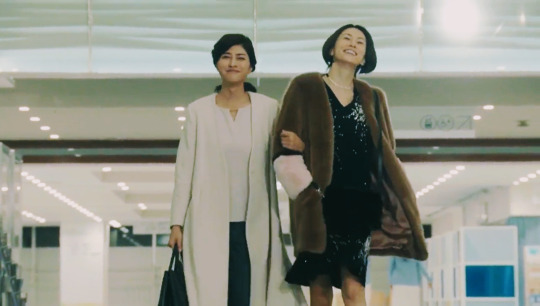
To be very honest, I was in two minds about including Doctor X on this list. It is, with a few notable exceptions, misogynistic and reductive in its depictions of women (especially in the first two seasons), gives too much screentime to objectively awful and subjectively annoying men, doesn’t respect the work done by medical personnel apart from surgeons, and on the technical front is formulaic, repetitive, and often lazy in its writing and presentation. Unfortunately, the dynamic between the genius surgeon protagonist Daimon Michiko (Yonekura Ryoko) and her anaesthesiologist wife partner friend Jounouchi Hiromi (Uchida Yuki) is almost unparalleled in its excellence.
The premise of the series is basic indeed: Daimon Michiko is a freelance surgeon with a healthy disrespect of rules and authority and, unluckily for her detractors, a cast-iron guarantee that she will succeed in any surgery, no matter how difficult. She’s initially portrayed as a lone wolf who’s dismissive of the entire hospital system and anyone who’s part of it— but her interest is piqued by the anaesthesiologist Jounouchi, who is skilled beyond her peers and chafes against the idiocy of her colleagues. For all its flaws, the first season – which is more serious and edgy in tone compared to the others, and isn’t an ensemble cast like the post-S3 seasons – is a fantastic depiction of two people being perfectly matched in skill, intellect, and outlook, and how they come together despite one being standoffish (Jounouchi) and the other not being used to reaching out to or even respecting other people (Daimon).
The seasons after that sadly ditch the emphasis on Jounouchi being Daimon’s professional equal, but in exchange offer up another rare and unexpected gift: two women in their late thirties / early forties who are partners both at work and in private. Jounouchi is Daimon’s designated anaesthesiologist, assisting with nearly every surgery, and she spends so much time at Daimon’s agency-office-slash-house you’d think she’d moved in. Also, after a point they just start being wonderfully dorky and comfortable with each other, while still being consummate professionals in the operating theatre. Although the show is very much focused on Daimon Michiko as its sole protagonist, Jounouchi is undoubtedly the character most significant to her – even more than Daimon’s father figure, the head of the freelance agency – and this is highlighted in the story from time to time. They are very, very good. I just wish the series was better.
Note: If you’re curious, I would recommend watching the very first episode in full– by the end you should know if you’re invested enough to continue, otherwise drop it and live in the happy knowledge that you dodged a bullet. If you aren’t so lucky, I’d advise skipping the surgery segments when they start to bore, and in general to skip liberally. Also, season 4 is not worth watching as a whole, except for the last two episodes, which absolutely should not be missed. Sigh. I can’t speak to seasons 6 and 7, due to having paused mid-S6.
Side note: If you’ve watched Doctor X already and liked it (or at least like Daimon and Jounouchi), but haven’t tried Miss Sherlock yet, definitely give that a go because there seems to be a big overlap in the fandoms. Maybe it’s because they both feature a genius protagonist, have the two largest female characters being work partners, and domestic vibes…?
(CW: sexism, genre-typical gore)
Bonus: SKY Castle / SKY 캐슬 (20 episodes, 2018) (subtext) - MyDramaList | AsianWiki
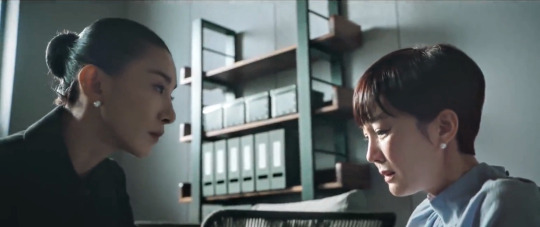
(Note: slight spoilers for the early episodes, but it’s necessary in order to give a more accurate recommendation regarding the F/F subtext, especially as the show is not primarily focused on any one relationship.)
This one’s a bonus because unlike the others on this list, there’s no close relationship between two female characters which could be interpreted in a romantic light. That’s not too surprising as the show is all about the women of a several super-wealthy families trying to get their children into the top Korean universities (equivalent to the Ivy League) whilst supporting their husbands in the rat race: a decidedly heteronormative premise, albeit one that’s executed in an award-winning manner.
So why am I listing it? Well, it’s because somehow, in this series about heteronormative and highly gendered nuclear families, it features possibly the most erotically-charged dynamic I have seen, even taking season 1 of Killing Eve into account. (Though it takes some time to get there, so if you try it out, please watch at least the first four episodes before making a decision!)
That honour goes to the problematic gem that is the relationship between the main character Han Seo-jin (Yum Jung-ah), who is willing to do whatever it takes to get her daughter into Seoul’s top medical school, and star tutor Kim Joo-young (Kim Seo-hyung), who is known for her 100% success rate. It starts off with a mild push-and-pull, when Han Seo-jin wants Coach Kim to take on her daughter, but is wary of the shady rumours surrounding her; the tutor stands firm, and Han eventually has to swallow her pride and accept the risks. Where it really comes into its own, though, is when Coach Kim starts to pose a legitimate threat to everything Han cares for: her daughter, her marriage (or rather, what her husband can give her), her position in the world. It becomes increasingly clear that Han should just walk away, and indeed she tries to do so many a time, only to bend in the end because the coach is key to fulfilling her dearest wish– and so to Han, for all she rages and resents and fears, Coach Kim is nothing less than temptation itself. This is the beating core of the show, and even as the plotting disintegrates and falls into melodrama in the second half, their scenes together still crackle with delicious tension every time. Watch it.
(CW: suicide, psychological abuse, child abuse, bullying, murder)
#kdrama#jdrama#sapphic#lesbian#gay#wlw#yuri#gl series#wlw series#she loves to cook and she loves to eat#tsukutabe#chaser game w#sky castle#doctor x#miss sherlock#night light#tokusatsu gagaga#painter of the wind#sono heart#list#wlw recommendations
489 notes
·
View notes
Text
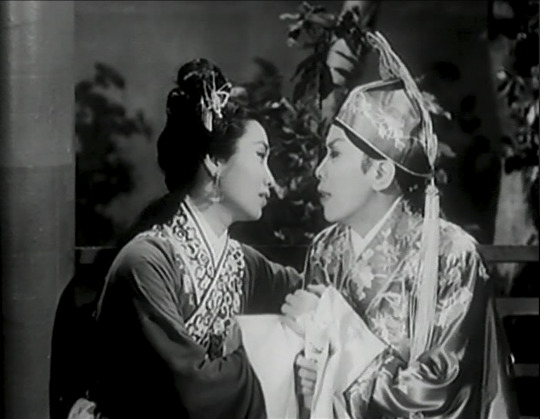
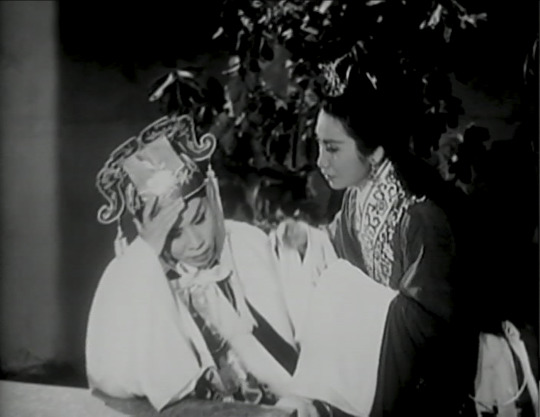

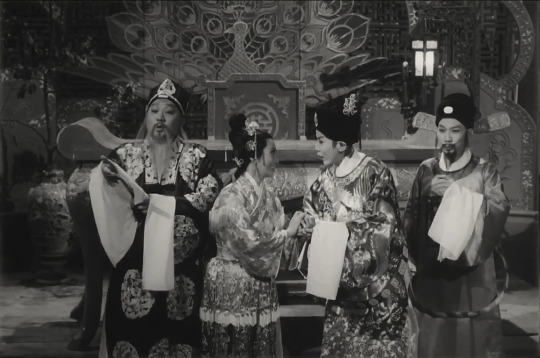
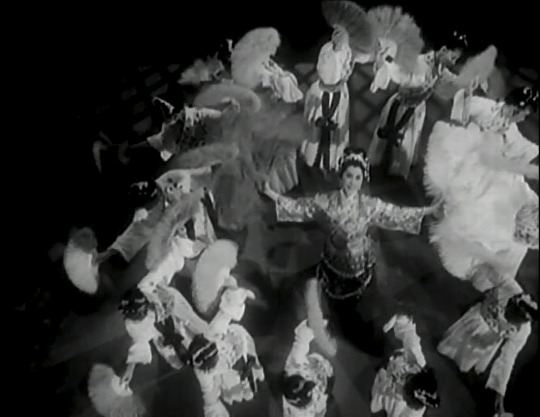
Screening Announcement! (Dec 10th & 17th, 2023)
Update as of 6 Dec 2023: There are still decent seats left for the 6pm & 9pm showings on Dec 10th, and for all four screenings on Dec 17th!
If anyone here will be in Hong Kong this December 10th or 17th (both Sundays), and has even a passing interest in Yam Kim Fai and Pak Suet Sin (see my post on them here), queerness in East Asia and/or the 1950’s, or Chinese opera, I strongly urge you to go to one of the eight screenings of the restored version of Butterfly and Red Pear Blossom (蝶影紅梨記)!
Not only is it a great romantic comedy (yes, really), it’s also a very rare opportunity to see a classic Cantonese opera movie – or indeed any black and white Hong Kong movie – with English subtitles and in 4K resolution. For a taster, check out this excellent dance scene (not 4K) and this video from the Hong Kong Film Archive about their restoration efforts!
On top of that, it’ll be showing in the cinema of the storied Sunbeam Theatre (新光戲院), which opened in 1972 and is Hong Kong’s last commercial Cantonese opera theatre. (It must be added that being able to go there will soon become an even rarer opportunity; the venue will sadly be closing in 2025 as heritage is apparently a joke in Hong Kong.)
Here's a quick outline of the story for those who need a bit more convincing:
Penned by the Shakespeare of Cantonese opera, Tong Tik Sang (唐滌生), this retelling of Yuan-dynasty opera Tale of Red Pear Flower (謝金蓮詩酒紅梨花) starts off fairly sober - courtesan So-chau (Pak Suet Sin) and scholar Chiu Yu-chau (Yam Kim Fai) are long-distance lovers, but before they are able to meet in person for the first time, So-chau is forced to fake her death to avoid being sent off to a barbarian warlord. But then it morphs into an unexpected romantic comedy: in her escape, So-chau ends up at a relative’s house… only to find that Chiu will be moving in as a guest there that very night. Unfortunately for her, she’s been forbidden by her uncle from disclosing her identity for fear of disrupting Chiu’s studies, and Chiu is extraordinarily – albeit adorably – dumb.
Apart from the two leads being played by women, it’s really easy to read queer themes into how So-chau is desperate with longing and yet unable to directly articulate her desires and identity, permitted only to hint and nudge. (As is the movie as a whole in some ways, since Hong Kong movies of that era were very prudish; even heterosexual kisses weren’t allowed onscreen.) Chiu, kind-hearted but oblivious, echoes the familiar figure of the queer crush. Also, Pak plays So-chau with the thirstiness of a marathon runner who hasn’t had a drop of water since the start of the race, so there’s that to enjoy too :)
Tickets are available on the Cityline website for HK$70 each (linked here – change the language to English by clicking “Eng” in the menu); note that you’ll need to make an account to make a purchase. Dec 10th and Dec 17th will both have four screenings each (12pm, 3pm, 6pm, and 9pm), but seating is very limited so you should definitely buy your ticket sooner rather than later!
#wlw recommendations#asian lgbtq#hong kong#cantonese opera#chinese opera#yam kim fai#pak suet sin#hong kong queer icons#yampak#yambak#pak sheut sin#bak sheut sin#theatre
24 notes
·
View notes
Text

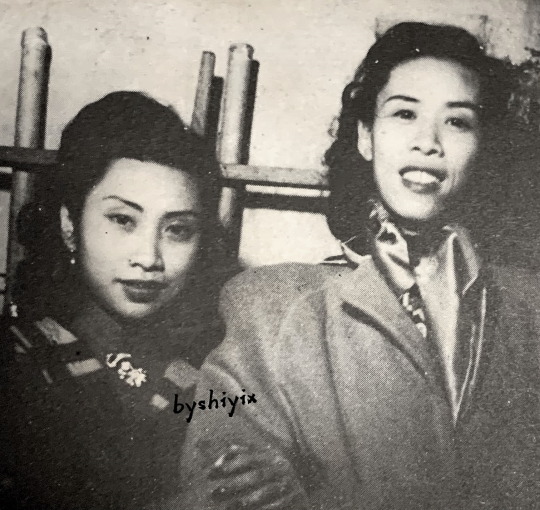
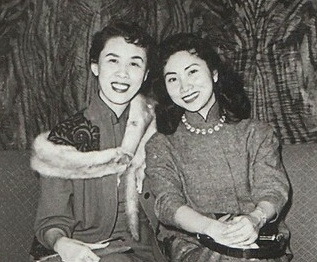
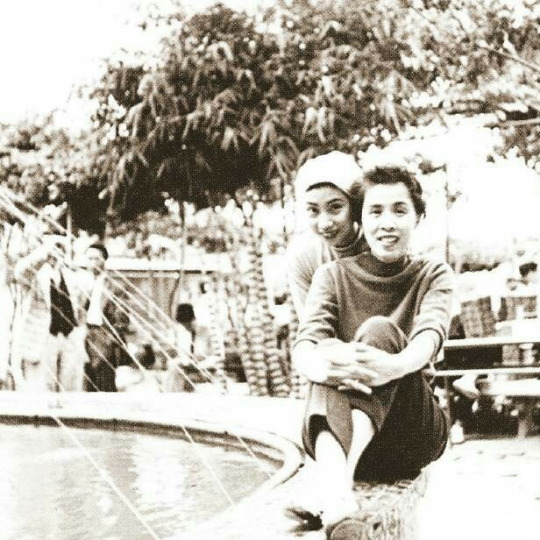

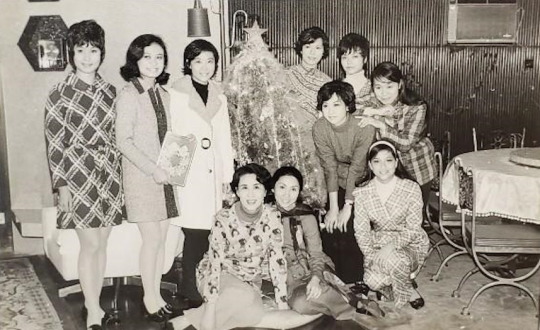

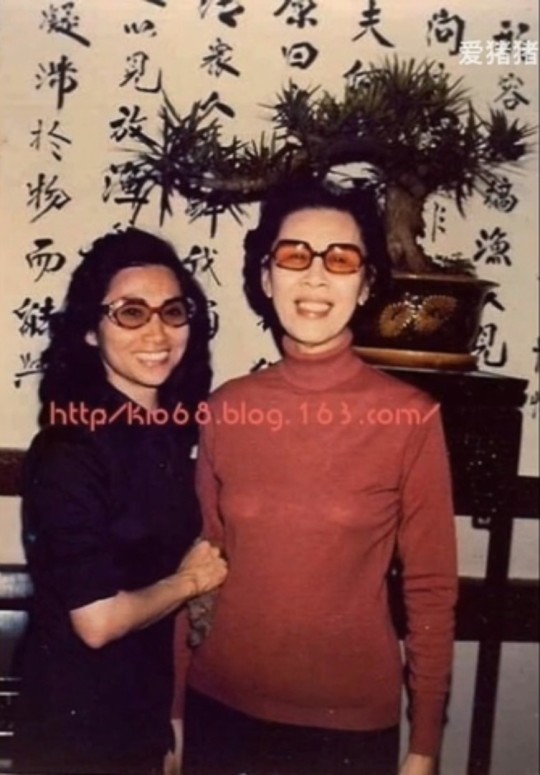
Female Queer Icons of Hong Kong // Yam Kim Fai (任劍輝) and Pak Suet Sin (白雪仙)
Photo 1: Promotional photo for 1955 contemporary movie The Model and the Car (玉女香車) (no video available) (Source: LCSD Museum Collection Search Portal)
Photo 4: Photo from Sin Fung Ming Opera Troupe's 1958 trip
Photo 5: Photo from a 1962 newspaper feature on Yam, Pak, and others at their (?) summer villa in Central, Hong Kong
Photo 6: Christmas celebrations with Yam, Pak, and their protégés of the Chor Fung Ming Troupe
Far and away the most iconic duo in Cantonese opera, Yam Kim Fai (任劍輝) and Pak Suet Sin (白雪仙) – commonly referred to simply as Yam-Pak (任白) – were famed for their partnership both on and off the stage… Click below to learn more!
Edit on 28/07/2023: Updated to link to a photo of the entrance to the Hong Kong Heritage Museum’s Pop Culture 60+ exhibit, and to add information regarding Yam and Pak's marriage status.
Iconic? How?
Yam-Pak are the face of Cantonese opera; you can't talk about the latter without mentioning the former. It's to the point where a gigantic picture of them graces the entrance to the Hong Kong Heritage Museum’s permanent exhibition on Hong Kong pop culture’s evolution across the past 60 years (“Hong Kong Pop 60+”) - they are the first thing you see upon entering!
Best known as the originators - with Yam playing the male leads and Pak the female leads - of five masterpieces of Cantonese opera, namely:
1. Princess Cheung Ping (帝女花)
2. The Legend of the Purple Hairpin (紫釵記)
3. The Dream Tryst in the Peony Pavilion (牡丹亭驚夢)
4. The Reincarnation of Lady Plum Blossom (再世紅梅記)
5. Butterfly and Red Pear Blossom (蝶影紅梨記)
(Note: Princess Cheung Ping, Purple Hairpin, and Butterfly and Red Pear Blossom were made into abridged movie versions, with the Sin Fung Ming troupe members reprising their roles from the theatre productions. Also, the "Fragrant Sacrifice" (香夭) duet from Princess Cheung Ping (movie clip) is one of - if not the most - famous songs in Cantonese opera.)
Yam and Pak were the leading pair and co-founders of the legendary Sin Fung Ming Opera Troupe (仙鳳鳴劇團; 1956-1961), which is widely held to have pushed Cantonese opera forward as an artform due to Pak and scriptwriter Tong Tik Sang’s (唐滌生) emphasis on poetic libretti and adapting source material from Chinese literature and history. (Note: it has been common practice since the 1930's for Cantonese opera troupes to be founded by key actor(s).)
They were also very active in the Hong Kong film industry in the 1950's, being paired in over 40 movies together across roughly 8 years. One of those – the aforementioned Butterfly and Red Pear Blossom (蝶影紅梨記) – is the sole Cantonese opera movie on the Hong Kong Film Archive’s 100-Must See Hong Kong Movies list (IMDB list / archived version of the official PDF). It's a well-deserved inclusion - check out this beautifully-shot dance scene.
Even their post-retirement activities had a significant effect on the industry! In the early 1960’s, they held auditions for prospective students and provided - for free - systematic, hands-on training to those who passed; Yam and Pak even hired other veterans to teach skills they personally were not as familiar with. Prior to this, apprentices were expected to learn primarily from observing their masters, and to pay handsomely for the privilege. Yam-Pak’s methods proved exceedingly effective: the Chor Fung Ming Opera Troupe (雛鳳鳴劇團; 1963-1992) starring their apprentices reigned supreme in the 1970’s-1980’s. Following this success, Cantonese opera institutes - most notably the major 1900s-era guild, the Chinese Artists Association of Hong Kong (八和會館) - started to offer systematic coaching to young hopefuls in the 1980's.
Okay, so why are they queer icons specifically?
The lazy answer is that they're queer icons because nearly all of Yam's roles were male, so Gender is involved by default, and since most hit Cantonese operas of the time were romances, that means you get to see two female actors performing being in love onscreen (and also on stage, but there aren't any video recordings from back then). So far, so Takarazuka Revue.
Female actors playing male roles in Cantonese opera
To give some context, each Cantonese opera performer specialises in one of four major role-types, and Yam was a sung (生) - i.e. an actor specialised in playing standard male roles. Female sung were fairly common in the 1910's-1930's due to women being banned from performing with men during that period, but when the ban lifted in the mid-1930's, many troupes shifted towards cis-casting. Yam was pretty much the only one whose popularity survived the transition. Just take a look at the huge number of Cantonese opera movies produced during the 1950’s-1960’s – you’ll be hard-pressed to find a female sung other than Yam, let alone one with top billing.
Happily, thanks to Yam's immense popularity, her profilic film career (over 300 movies!), and the prominence of Sin Fung Ming works in the Cantonese opera canon, there has been a resurgence in female sung which endures to this day. Two noteworthy examples are Yam's protégé Sabrina Lee/ Loong Kim Sang (龍劍笙) - a star in her own right - and Joyce Koi/ Koi Ming Fai (蓋鳴暉), one of the biggest names still active in the industry.
(Note: perhaps due to cinema being more "realistic" in nature, Yam's early movies often involved her playing female characters cross-dressing as men, including in some Cantonese opera movies. However, she received increasingly more male roles as her fame grew, and from the mid-1950's onwards she was playing male characters onscreen nearly exclusively-- even in non-Cantonese opera movies! See Photo 1 above.)
What sets Yam and Pak apart is that they were particularly known for their chemistry. Long before Sin Fung Ming's formation in 1956, the advertising copy for their first Cantonese opera movie together - Frolicking with a Pretty Maid in the Wineshop (酒樓戲鳳, 1952) - declared "Only this movie has Yam-Pak flirting on the silver screen" (source - 華僑日報 1952/05/23-26). And indeed, they were popular for their flirtatious duets: their Cantonese opera works invariably contained at least one, and such scenes made it into some of non-Cantonese opera (i.e. "contemporary") movies too. In fact, there are not one but two contemporary movies where Yam and Pak's characters are not paired up and yet still sing a duet together in such a way that their significant other(s) become convinced that the two are in romantically interested in each other - see 1952's Lovesick (為情顛倒) and 1956's The Happy Hall (滿堂吉慶) - a weirdly specific situation which doesn't crop up in the other, non-Yam-Pak movies I have seen.
Speaking of contemporary movies, let's talk about a certain plotline that keeps cropping up in works featuring the both of them and where Yam plays a woman! Six of the eleven movies which fit that criteria involve Yam's character cross-dressing as a man (a common characteristic across Yam's handful of female roles), and Pak's character falling for her. Nothing ever comes of it, of course, but, um. It was certainly a trend. Actually, even their very first movie together - 1951's Lucky Strike (福至心靈) - falls into this category.
Such storylines, and the emphasis on their chemistry, are particularly interesting given that both Yam and Pak remained ostensibly unmarried throughout. This was unusual for female performers of their stature, who tended to wed in their twenties, often to fellow-actors or wealthy men (e.g. Hung Sin Nui/紅線女, Fong Yim Fun/芳艷芬, and Tang Pik Wan/鄧碧雲)... In contrast, by the time Yam-Pak retired from the stage in 1961, they were both over 30 years old and without husbands.
Also, did I mention they were popularly believed to be living together? There doesn't seem to be any conclusive evidence either way... although it's a little strange that separate newspaper pictorials depicting "Yam at home" and "Pak at home" seem to be of the same location... however what is conclusive is that they did spent a lot of time together offstage. Pak has talked about how when they had no guests over, Yam would watch TV by herself while Pak was in the living room (source - p93), and protégé Mandy Fung/ Mui Suet Sze (梅雪詩) has said that Pak would sometimes cook for Yam at home (source - 03:53~). They would also celebrate birthdays, New Year's, and Christmas together (see Photo 6 for an example of the latter).
Shortly after Yam's passing in 1989, Pak set up the Yam Kim Fai and Pak Suet Sin Charitable Foundation (任白慈善基金) to support the arts and provide welfare for the elderly. In 1996, Pak made a large donation to Hong Kong University, resulting in one of the buildings being renamed Yam Pak Building (任白樓) in thanks (source).
Thanks for reading! Please feel free to DM me or send an ask if you have any questions, or are just interested in learning more.
If you made it here, have this bonus piece of trivia - Yam and Pak were also well-acquainted with Hong Kong's preeminent queer icon, Leslie Cheung (張國榮), who was a massive fan of theirs. Sadly there don't seem to be any pictures of them before Yam's passing, but here's one of Pak (centre) having afternoon tea with Cheung (left) and his long-term romantic partner Daffy Tong (唐鶴德) (right) at the Cova cafe in the Pacific Place shopping mall.
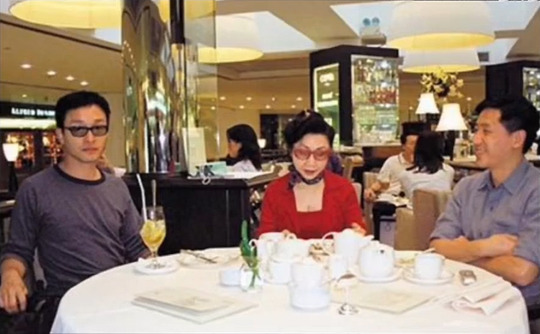
#wlw recommendations#sapphic#lgbtq#asian lgbtq#hong kong#theatre#cantonese opera#chinese opera#yam kim fai#leslie cheung#pak suet sin#yampak#yambak#pak sheut sin#bak sheut sin#hong kong queer icons#not me hastily adding tags because i keep forgetting certain ones
152 notes
·
View notes
Text
A few sapphic film recs!
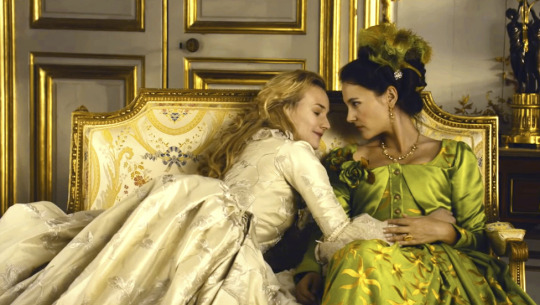
Just a few recommendations for sapphic films under 2 hours which may or may not have flown under the radar:
Moonlit Winter / 윤희에게 (1hr 45m, 2019, dir. Lim Dae-hyung)
Professor Marston and the Wonder Women (1hr 48m, 2017, dir. Angela Robinson)
Who's the Woman, Who's the Man / 金枝玉葉 2 (1hr 50m, 1996, dir. Peter Ho-Sun Chan)
Sisterhood / 骨妹 (1hr 37m, 2016, dir. Tracy Choi)
DEBS (1hr 31m, 2004, dir. Angela Robinson)
Farewell, My Queen / Les adieux à la reine (1hr 40m, 2012, dir. Benoît Jacquot)
Bonus - short film: Love Does Human / 사람 하는 사랑 (24 mins, 2019, dir. Oh Seon-ju)
Commentary under the cut!
1. Moonlit Winter / 윤희에게 (1hr 45m, 2019, dir. Lim Dae-hyung) - IMDB | MyDramaList

This movie is about a daughter (Kim So-hye) who finds out about her divorced mother’s (Kim Hee-ae) past with another woman (Katase Jun), and how in encouraging her mother to reconnect, the two finally open up to each other as well. Dry stuff on paper, but there’s more to it: the mother and her former lover didn’t just break up, they were split apart by their families as teenagers and the mother was forced to marry a man against her will. In short, it deals with the aftermath of the typical “bad ending” of older stories featuring WLW characters, wherein schoolgirls in love would be separated and married off to preserve the heteronormative status quo.
Although the queer relationship does not get much screentime at all – the two characters share a single scene, there are no flashbacks, and there’s not even a hug – queerness remains at the heart of the movie. It’s a rare depiction of how the repression of queerness leaves scars on people which affect how they engage with the world, but which also shows that as long as they are alive, there is still hope that those scars can be healed. Also, despite the heavy-sounding subject matter, it’s a very gentle experience: there are no direct depictions of homophobia and no sensationalism, just a little story of human connection unfolding in a snow-cloaked Hokkaido.
2. Professor Marston and the Wonder Women (1hr 48m, 2017, dir. Angela Robinson) - IMDB
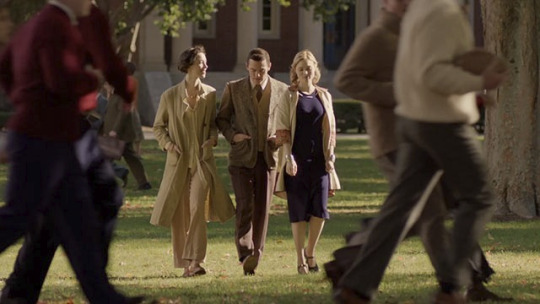
The blurb on IMDB says that this movie is about “psychologist William Moulton Marston (Luke Evans), and his polyamorous relationship with his wife [Elizabeth] (Rebecca Hall) and their mistress [Olive] (Bella Heathcote) who would inspire his creation of the superheroine, Wonder Woman”. As someone who is not particularly drawn to biopics, male protagonists, polyamory, BDSM, or Wonder Woman, I assumed that this movie wouldn’t be my jam and so didn’t watch it until quite a while later – which is when I discovered just how wrong I was.
First, the two women take up just as much of the movie’s focus as Marston. Elizabeth, Marston’s wife and fellow psychologist, is highly intelligent but equally highly-strung; she does not know how to deal with her husband’s attraction to new research assistant Olive, nor Olive’s attraction to both her husband and Elizabeth herself, and this internal conflict (even after the three enter into a polyamorous relationship) features heavily in the story. Second, although it declares itself to be “based on a true story”, the movie is not especially interested in recreating or representing the past. Rather, the historical elements are used as a framework to explore certain ideas: Diana’s Lasso of Truth symbolises how progress and healing must be first founded upon honesty, for example. The polyamory and BDSM is also not at all sordid or sensationalised, but rather presented in a nuanced (though still sexy!) manner. More than anything, this is a movie with a big heart and big ideas, and should be judged on its own merits.
3. Who's the Woman, Who's the Man / 金枝玉葉 2 (1hr 50m, 1996, dir. Peter Ho-Sun Chan) - IMDB | MyDramaList
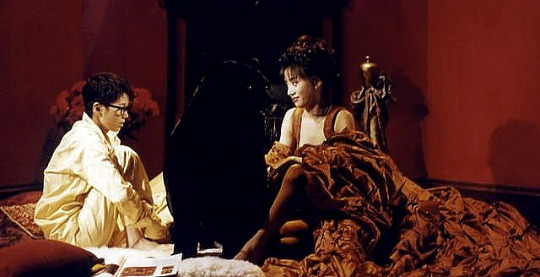
All you need to know going into this sequel of 1994 movie He's a Woman, She's a Man (金枝玉葉) is that main character Wing (Anita Yuen) is a woman who has found both fame and (heterosexual) love while disguising herself as a male idol, and that her relationship with record producer Sam (Leslie Cheung) is known to the general public— although it is perceived as being homosexual in nature due to her persona. At this point, you might be wondering why an M/F romantic comedy is on this list, but this movie is a bit odd in that instead of focusing only on problems such Sam’s internalised homophobia and misogyny (both of which are addressed in the story), one of the new obstacles facing the couple is the female lead meeting female pop star Fong Yim Mui (Anita Mui)… and both starting to fall for each other.
I was surprised at how sensitively Wing and Fong Yim Mui’s respective arcs are handled, especially for a mainstream movie from the 90’s starring two of Hong Kong’s most popular performers at the time. Instead of giving the two women a meet-cute and leaving it at that, a lot of care is put into showing them processing and coming to terms with their feelings in their own time. Romantic and sexual attraction is also highlighted separately, which is refreshing given how they are usually depicted as inextricably linked even now… Obviously Wing and Fong Yim Mui don’t end up together, but their feelings aren’t dismissed and – relative to the narrative constraints – the ending is a warm, optimistic one. Also, Anita Mui gives an absolutely award-worthy performance in one of the scenes with her character and Wing, so fans of her should definitely give this movie a try.
Important note: Although there’s much that’s good about it, Who's the Woman, Who's the Man is far from perfect. Early on, there’s a masquerade party where two of the characters are wearing masks which look like racist caricatures, and the masks are crop up in multiple scenes in the film. More serious is the subplot about a male character who keeps trying to win over a lesbian, culminating in her agreeing to sleep with him once while he’s dressed as a woman (CW: transphobia, homophobia) – though this storyline ends with the man accepting that she really is gay and parting on friendly terms. That said, these problems are already mild compared to the actively hateful transphobic and homophobic jokes present in so many of its contemporaries, so if you’ve watched a 90’s Hong Kong comedy before, chances are that your tolerance level is more than high enough.
4. Sisterhood / 骨妹 (1hr 37m, 2016, dir. Tracy Choi) IMDB | MyDramaList
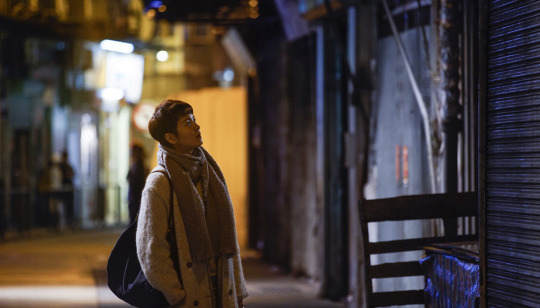
Sisterhood opens with tragedy. Originally from Macau, main character Sei (Gigi Leung) is living quietly in Taiwan with her husband after the 1999 Handover when her life is overturned by a newspaper personal ad informing her that her long-estranged friend and colleague Ling has passed away. The movie is shot through with flashbacks to earlier times, tracking a young Sei (Fish Liew) as she starts doing sex work and is taken under the wing of the more experienced Ling (Jennifer Yu) and her friends. Memories of togetherness and community are juxtaposed against sequences of present-day Sei struggling to navigate her grief, the tensions of the now-fractured friend group, and a Macau that has changed just as much as she has. The acting and script can be clunky in places but the sentiment shines through, especially after the first third, at which point the movie starts honing in on Sei and Ling’s relationship. It’s not a happy story, but nor is it defined by sadness; instead, it posits that the past is not merely to be mourned, that it is instead something that can shape and provide a foundation for the future. I won't talk too much about how queerness figures into this story, due to spoilers, but rest assured that it is present and important!
5. D.E.B.S. (1hr 31m, 2004, dir. Angela Robinson) - IMDB
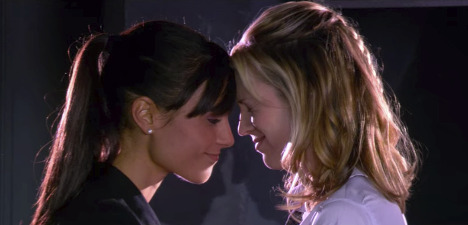
Okay, you've probably heard of this one before if not watched it already, but anyway! This was the first WLW movie I watched, and for a long time, the only one which I actually enjoyed. It’s about an elite spy (well, more like an honours student at spy school) (Sara Foster) and a criminal mastermind (Jordana Brewster) falling for each other, a premise which is just as fun and over-the-top as it sounds. The movie does a great job of mixing action, humor, and romance, and it doesn’t overstay its welcome – it’s got a nice compact runtime and a cracking pace. There’s still nothing quite like it in my opinion, though I’m very welcome to any recommendations in this line (my askbox is open if you have any!).
6. Farewell, My Queen / Les adieux à la reine (1hr 40m, 2012, dir. Benoît Jacquot) - IMDB
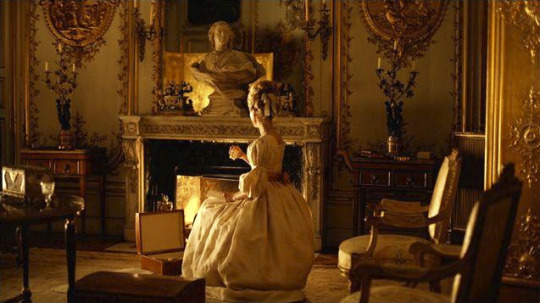
Loosely based on Chantal Thomas’ novel of the same name, Farewell, My Queen is a portrait of French nobility in decline, following maidservant Sidonie Labarde (Léa Seydoux) who is in the service of Marie Antoinette (Diane Kruger). It's a beautiful, lavish production which effectively conveys the perspective of a servant locked in the gilded cage that is Versailles during the French Revolution, and is a rare case of a historical figure as famous as Antoinette being presented as queer in a serious historical drama.
That being said, the queerness is mostly background, coming mainly in the form of Antoinette’s crush on? relationship with? duchess Gabrielle de Polignac (Virginie Ledoyen)— though a case can be made for Sidonie, whose outward opacity belies an unwavering, almost unsettling, devotion to her queen. Also, be warned that the movie has many a dodgy shot of cleavage, and two instances of unnecessary and voyeuristic nudity... but other than that, it really does have gorgeous cinematography.
Fun fact: there really were rumours about Antoinette having a scandalous relationship with the duchess, although these have nearly always been written off as baseless reputation-smearing.
Bonus - short film: Love Does Human / 사람 하는 사랑 (24 mins, 2019, dir. Oh Seon-ju) - MyDramaList
youtube
Some say that the best science fiction puts a spotlight on some part of the human condition, and this short film does just that.
Main character Tae Eun's (Kim Min-ju) girlfriend Joo An (Jang Sam-yi) no longer has a human body: after carrying out a medical operation which transferred her consciousness to a computer system, she now has a web-camera for her eyes, a speaker for her mouth, and control over their home's devices for her hands. And although the change was by Joo An's choice and Tae Eun was supportive, the pair struggle to adjust to this new reality, and are confronted with the need to communicate and to consider each other's perspectives.
Love Does Human has a bit of a slow start, and there were points where I didn't understand why the characters were reacting in a certain way, but it all comes together beautifully in the end. Through its sci-fi premise, viewers are encouraged to think about real-life problems using a different angle, and the movie never gets too heavy. Also, shoutout to some excellent voice work from the two actors - Joo An is performed nearly entirely through voice but she feels deeply human and present, and Tae Eun's actor also has a standout scene featuring some great voice acting. All in all, it's a short film that's well worth checking out (especially since the director has made it available for free, with English subtitles, on Youtube - embedded above)!
#sapphic#lesbian#gay#wlw#wlw media#moonlit winter#professor marston and the wonder women#debs#farewell my queen#love does human#wlw recommendations#list#sapphic films#whos the woman whos the man#金枝玉葉2#sisterhood 2016#骨妹
182 notes
·
View notes
Text
Yuri Subtext Anime List

A supplement to my earlier yuri anime masterlist, this list covers anime which aren’t marketed as yuri but which prominently feature female-female pairs, i.e. series with (or which are known for) strong F/F subtext! Since subtext is so subjective, this post only includes series which I’ve actually watched, and so is by no means intended to be comprehensive.
Since the above description would not cover certain series with well-known yuri pairings, I've also included "bonus rounds" for the curious (although these are still limited to series I have watched).
At-a-glance list:
Revolutionary Girl Utena (39 episodes + 1 movie, 1997)
NOIR (26 episodes, 2001)
Puella Magi Madoka Magica (12 episodes, 2011)
Haibane Renmei (13 episodes, 2002)
.hack//SIGN (26 episodes, 2002)
Read or Die / R.O.D. the TV (26 episodes, 2003)
Mobile Suit Gundam: The Witch From Mercury (24 episodes, 2022)
Black Rock Shooter (8 episodes, 2010)
Izetta: The Last Witch (12 episodes, 2016)
Violet Evergarden: Eternity and the Auto Memory Doll (movie, 2019)
Canaan (13 episodes, 2009)
Ga-Rei: Zero (12 episodes, 2008)
Bonus rounds:
Sailor Moon S3 (38 episodes, 1994) (subtext)
Mai-Hime (26 episodes, 2004) (canon)
Psycho-Pass (41 episodes + 3 movies, 2012) (canon)
My Next Life as a Villainess: All Routes Lead to Doom! (24 episodes + movie, 2020) (canon)
Details under the cut!
1. Revolutionary Girl Utena (39 episodes + 1 movie, 1997) - Anime News Network | MyAnimeList
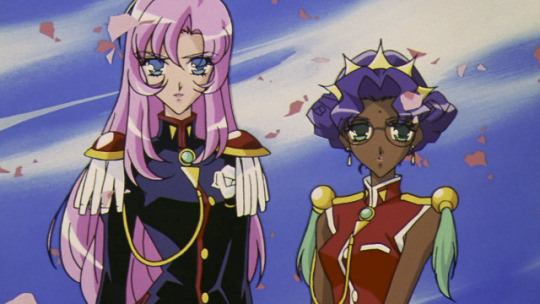
(Copied from the Yuri Anime Masterlist post, since technically it wasn’t marketed as yuri)
When she was a child, Tenjou Utena (Kawakami Tomoko) was saved by a passerby prince, so she decided that she too wanted to become a prince as an adult. Fast forward to high school, and she hasn’t forgotten that conviction: Utena gets sucked into a series of duels while trying to protect her best friend’s honour. After winning the first duel, she becomes ‘engaged’ to the eccentric “Rose Bride” Himemiya Anthy (Fuchizaki Yuriko), and the two start living together in the same dormitory.
First things first: there are a million content warnings for this series, including implied rape, sexual assault, incest, and homophobia. Although the issues are handled well (in my opinion), it does go to very dark places, so those wanting a light, fun anime to unwind to should look elsewhere. Second, this series is very much a psychological drama utilising the episodic duels as a way of hone in on Utena’s opponents and their stories, so Utena and Anthy’s relationship – though important – is definitely not the focus of the anime. Third, the TV series is limited to hinting at the romantic relationship between Utena and Anthy, not to mention that they spend most of the series being little more than acquaintances rather than actual friends. The movie Adolescence (which can be taken as a retelling or sequel, depending on your perspective) is much more explicit on this front, but also suffers from a significantly shorter runtime and a much more opaque approach to storytelling.
That being said! If you’re okay with all of the above, this series is pretty much essential. The simplistic premise belies a much more complex and nuanced story about gender roles, sexuality, and human relationships and remains one of the smartest anime ever made, over twenty years on.
2. NOIR (26 episodes, 2001) - Anime News Network | MyAnimeList
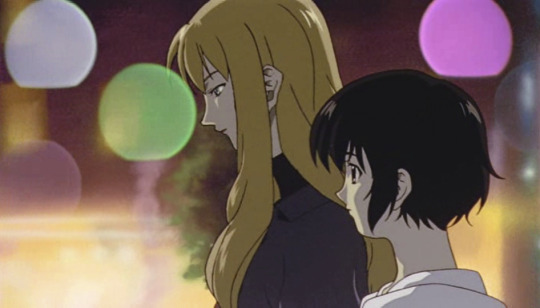
The first in anime studio Bee Train’s “girls with guns” trilogy, NOIR follows globetrotting assassin duo Mireille Bouquet (Mitsuishi Kotono) and Yuumura Kirika (Kuwashima Houko) as they partner up to search for Kirika’s missing memories and the truth behind Mireille’s parents’ deaths. The series is pleasingly restrained despite the sensational premise, alternating between “business trips” to far-flung locations and snapshots of the pair’s domestic life in Mireille’s Paris apartment, and devoting more time to the unfolding of the relationship between the prickly Mireille and puppy-like Kirika than to action sequences. I won't say too much due to spoilers, but their relationship numbers among my favorites due to how naturally it is developed throughout and how it is very much at the heart of the series both narratively and thematically.
This is also the first anime soundtrack entirely composed by the legendary Kajiura Yuki, heralding a long collaboration with director Mashimo Kouichi, and her mix of classical and modern sounds provides the perfect accompaniment to NOIR’s atmospheric cityscapes. Also, for fans of Mitsuishi’s work (Sailor Moon! Utena! Evangelion!), I’d say NOIR is a must-watch for her performance alone; her Mireille is brittle and proud, and she brings so much humanity and nuance to the role. In fact, I don’t care if you’re a fan of Mitsuishi or Kajiura or assassins or whatever, please just try the first episode— this anime deserves way more love!
3. Puella Magi Madoka Magica (12 episodes, 2011) - Anime News Network | MyAnimeList

Puella Magi Madoka Magica opens with ordinary middle school girl Kaname Madoka (Yuuki Aoi) standing in the ruins of her hometown, watching as a lone girl struggles to defend what remains of the city against a much more powerful enemy. A little rabbit-like creature informs Madoka that the girl is sure to lose without her help, and so Madoka decides to become a magical girl right then and there— at which point she wakes up and dismisses it as a strange nightmare. But then that very day, her school receives a new transfer student who looks just like that mysterious girl, and she also finds a hurt animal that closely resembles the rabbit-like creature from her dream. Madoka is then faced with certain questions: do magical girls actually exist, and will she become one herself?
Since Madoka Magica was all the rage back in the early 2010s, I don’t think it too much of a spoiler to say that the cheery first three episodes hide a dark, gritty story which uses the concept of magical girls to explore the tumultuousness of adolescence. The queer subtext only comes in at the end but tight plotting and inventive presentation make this show a quick watch— and if you’re the type who likes queerness in fiction to be intense, world-shakingly significant, and a wee bit problematic, the payoff should be more than enough. A word of warning: there is a movie sequel called Rebellion, but if you’re happy with the ending of the anime, it’s best not to watch it (although I love the movie, myself).
Side note: I won’t go into it too much due to spoilers but if you liked Madoka Magica you might want to check out Serial Experiments Lain – even if most of it is utterly incomprehensible (as it was to me), it’s worth watching until the very end (wink). Also, for the rare fan of Rebellion, Adolescence of Utena is a must-watch if you haven’t checked it out already; so much can be said about its conceptual and aesthetic influences on Rebellion!
4. Haibane Renmei (13 episodes, 2002) - Anime News Network | MyAnimeList

(Note: slight spoilers about the tone and overall themes of the show – but I think it’s necessary for the purpose of writing a more representative summary.)
Written by ABe Yoshitoshi – character designer of cult classic anime Serial Experiments Lain and author of the very unfinished manga which this show adapts and significantly develops – Haibane Renmei starts off as a light-fantasy slice-of-life anime following freshly-arrived Rakka (Hirohashi Ryou) as she searches for a suitable job in the town of Glie, before transforming into a nuanced exploration of grief and depression about halfway through. To say more would be really too spoilery, but I just want to say that this has probably the most grounded and sensitive depiction of depression I have seen in an anime; it shows that sometimes people struggle even if everyone around them is kind and supportive, but remains hopeful about the healing power of time and understanding. The subtext is between the protagonist and Reki (Noda Junko), the first person she meets, who also helps her get acclimatised to her new life in Glie. Again, I won’t say more, but their relationship really is wonderful. That being said, this show does touch upon suicide and suicidal ideation in the course of discussing these themes, so please steer clear if that is something you are wary of.
5. .hack//SIGN (26 episodes, 2002) - Anime News Network | MyAnimeList
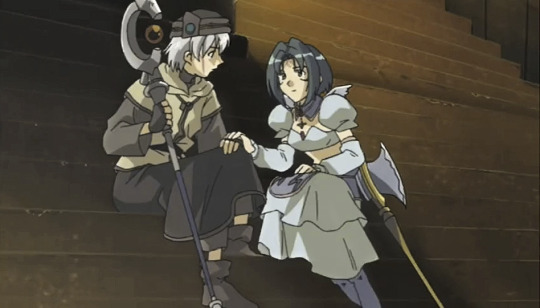
A standalone spinoff of the .hack PS2 games, this show was the most well-known anime about players getting trapped inside a multiplayer game before Sword Art Online’s arrival in 2012 (ironically, Kajiura Yuki composed the music for both). Rather than being an action-adventure story about a heroic protagonist trying to find a way back to the real world, SIGN stands out as an introspective piece, far more interested in the psychology of those who play online games and the issues of human connection and identity. In fact, the female protagonist is all too happy to remain within the MMORPG as male player-avatar Tsukasa (Saiga Mitsuki) after becoming unable to log out; the story is more about how the player grows to accept the real world with the help of the other players she meets, rather than about figuring out the exit route.
On the F/F side, some way into the series, Tsukasa makes an instant connection with fellow player-character Subaru (Nazuka Kaori) and they soon start spending a lot of time together. I really love their scenes together; the series' masterful use of body language, framing, and music all comes together to create these beautifully tender moments of intimacy. Although there’s no kiss scene nor explicit discussion of dating etc., a lot of the other characters talk about their relationship and perceive it as being romantic, to the point where one gets homophobically “worried” about Subaru when they find out that the player controlling male avatar Tsukasa is female. Tsukasa and Subaru's relationship becomes a lynchpin for both characters' development, and in general is used to illustrate the series' underlying themes in a thoughtful and heartwarming way.
6. Read or Die / R.O.D. the TV (26 episodes, 2003) Anime News Network | MyAnimeList

A spinoff of the Read or Die series which takes more from espionage thrillers and Hong Kong action flicks than shounen anime, R.O.D. the TV takes the unusual approach of starting with its main character - elite paper-maniuplating superspy Yomiko Readman (Miura Rieko) - being nowhere to be seen after burning down the British Library in a dramatic resignation announcement. Instead of focusing on her, or the spy agencies clashing in her absence, the story instead follows her friend Sumiregawa Nenene (Yukino Satsuki), who joins up with a trio of sisters with paper-manipulating powers and criminal connections in her quest to find out what happened to Yomiko. The queerness is mainly implied through Nenene's focus on Yomiko, which is unrequited and sadly fizzles out narratively speaking in the back half. Unfortunately, this is coupled with an increased focus on more heteronormative topics, such as Yomiko's grief over her dead male lover, and the child one of the characters had with the villain of the OVA. That being said, I also want to shout out this series' surprisingly earnest depiction of budding queerness in a young (like, elementary-school young) side character - something that is rare in fiction even now.
7. Mobile Suit Gundam: The Witch from Mercury (24 episodes, 2022) - Anime News Network | MyAnimeList
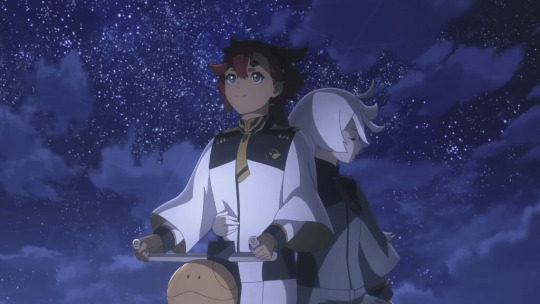
The most recent entry on this list by far (the final episode aired just a day ago at time of writing), The Witch from Mercury initially seems to forgo the Gundam franchise’s usual grand scale, being set in an academy run by the corporate giant Benerit Group. Main character and new student Suletta Mercury (Ichinose Kana) - the franchise’s first female protagonist since its beginnings in 1979 - accidentally bumbles her way into fighting a mecha duel, and, when she wins, is shocked to find that she is now engaged to the sole heiress of that self-same corporate giant, her classmate Miorine Rembran (Lynn). So far so Utena, but after the first episode, things start to diverge significantly: though the duels continue, the focus shifts to how big-picture tensions such as the manoeuvring within the Benerit Group and the conflict between the space colonisers and people on Earth play out within the student body, and how the arrival of Suletta and her mysteriously cutting-edge mecha start to shake up the status quo… until things come to an explosive head.
For those who curious about G-Witch due to Suletta and Miorine, but who wouldn’t normally be interested in Gundam or space operas, I’ll just say that how you feel will probably depend on how you approach the relationship. You’ll probably be disappointed if looking for a canonical queer romance, but going in with lower expectations may leave you pleasantly surprised. Season 1 offers plenty to enjoy in terms of Suletta’s earnest attempts to be a good “bridegroom” and the tsundere Miorine’s bouts of jealousy over Suletta, and in Season 2 they share some emotional moments together (although do note that their relationship, while still important, takes a bit of a back seat since there is So Much going on).
Side note: Some might criticise Gundam for taking so long to have a female main character, but let’s not forget about how the even older Ultraman (1966), Kamen Rider (1971), and Super Sentai (1975) franchises still have not had a single mainline series featuring a female protagonist… Come on guys, I’m dying for a female-led Kamen Rider over here!
8. Black Rock Shooter (8 episodes, 2010) - Anime News Network | MyAnimeList

One of the two anime inspired by the Hatsune Miku song of the same name, this Okada Mari-penned series hones in on the passionate friendships and jealousies of a group of middle-school girls. In a twist that feels informed by the psychological allegory of the popular Persona games, this interpersonal drama plays out in the surreal battle world of the music video, with the titular Black Rock Shooter being the main character’s alter-ego. Of particular interest is the first half’s focus on the blossoming friendship between protagonist Kuroi Mato (Hanazawa Kana) and her shy classmate Takanashi Yomi (Sawashiro Miyuki), which has strong overtones of two girls developing crushes on each other – it doesn’t go smoothly, but hey, that’s life.
9. Izetta: The Last Witch (12 episodes, 2016) - Anime News Network | MyAnimeList

Set during what is basically World War 2, Izetta: The Last Witch asks the daring question of “What if a small European country about to be invaded by alternate-history Nazi Germany could fight back with magic… and what if it was (subtextually) yuri?” The show follows politically-minded princess Finé as she and her best friend (read: girlfriend) Izetta think up ways to leverage the latter’s witchy gifts to save the country from invasion – a rare case of a military anime where female characters are significantly involved at the strategic stage. Those who enjoy the classic princess-and-knight trope may find something to like as long as they are fine with Finé and Izetta not having much relationship development (as their dynamic is established from the start) and them not having many one-on-one scenes together (as the series’ main focus is on the political manoeuvring). Note that this show is also pretty heavy on the fanservice – IIRC there was at least one moment of egregious sexualisation per episode.
Side note: those who like Izetta may also want to check out Last Exile: Fam, the Silver Wing, a female-focused dieselpunk anime with a lot of military strategizing and a very cool world setting, though Izetta is better-paced and the main relationship is much more plot-significant. (That being said I do like the relationship between Fam side characters Tatiana and Alistair… Tatiana is probably the adult character with the most screentime in Fam, being the main characters’ commanding officer, and although it’s very background, she has this cutely settled dynamic with former piloting partner turned wife right-hand woman Alistair.)
10. Violet Evergarden: Eternity and the Auto Memory Doll (movie, 2019) - Anime News Network | MyAnimeList

(Note: this entry’s a slightly weird one, it only covers the first 40 minutes of this movie due to it being basically two episodic stories smushed together into a single package, and only the earlier story is relevant to this list.)
In this standalone spinoff of the Violet Evergarden anime series – itself an adaptation of the light novel series by Akatsuki Kana – the titular protagonist Violet (Ishikawa Yui) takes a break from ghostwriting letters to serve as companion to aloof young noblewoman Isabella York (Kotobuki Minako) in her last months of finishing school. The story is a quiet coming-of-age tale focusing on how the kind (and rather dashing!) Violet helps Isabella to open up, or, in simpler terms, it’s fodder for butler-and-lady fans. Don’t get your hopes up too much, though: Violet learning about her romantic feelings for her deceased male superior is one of the main throughlines of the anime, and this (half of the) movie also ends with a heterosexual arranged marriage for Isabella. That being said, this movie is really a feast for the eyes, its historical-fantasy setting being brought out with beautiful backgrounds and detailed linework, so it’s worth checking out if you don’t mind the very Class S narrative.
Side note: if you want F/F butler-and-lady or princess-and-knight vibes I would really recommend watching Fate/Zero for Saber and Irisviel – yes Irisviel is already married to one of the (male) main characters and yes Saber is absolutely the main love interest for the famously-straight Fate/stay night, but their dynamic is really good and Saber gets to wear a stylish suit and be all chivalrous to a woman… Please watch the third episode of season 1 at least…
11. Canaan (13 episodes, 2009) - Anime News Network | MyAnimeList

There’s quite a lot going on in Canaan – perhaps unsurprisingly so for a spinoff of the FMV visual novel 428: Shibuya Scramble, which is famous for its intertwined storylines – but in true action-movie blockbuster style, all you really need to know is that the titular mercenary Canaan (Sawashiro Miyuki) is on a hunt for her mentor’s protégé-turned-murderer, and a lot of flashy fighting is involved. Also, there's no need to worry if you haven't played the original game, as Canaan is pretty much a standalone work and all of the significant characters are original to the anime. Yuri-minded viewers may enjoy her clashes with the villain Alphard (Sakamoto Maaya), but the main source of F/F subtext is her relationship with the young photographer Maria (Nanjo Yoshino), for whom she cares deeply and must rescue on multiple occasions. However, do be warned that the one canonically queer character in the show – Alphard’s subordinate Liang Qi (Tanaka Rie), who is fixated on her boss – is handled very badly, being portrayed as a raving predatory lesbian who is mocked, rejected, and finally killed by the object of her affections. Canaan and Maria’s relationship is also framed very definitively as friendship by the end of the series, although they don’t get paired off with male characters. IIRC there’s also some fanservice but I can’t remember the details as it was a long time ago, sorry.
12. Ga-Rei: Zero (12 episodes, 2008) - Anime News Network | MyAnimeList

Back in the old days, I had heard this show talked about in the same breath as yuri classics such as Kannazuki no Miko and Mai-Hime, and, well, like those series it comes with significant caveats (though thankfully there is no sexual assault). Although it’s a prequel to the Ga-Rei manga by Segawa Hajime, the anime is basically standalone and focuses on original characters Kagura (Chihara Minori) and Yomi (Mizuhara Kaoru), the latter of whom welcomes protagonist Kagura into her family and demon-hunting squad, only to leave the team in a devastating betrayal. After the explosive opening, the series jumps back to explore the events leading up to that point; fans of director Aoki Ei’s work on Fate/Zero should note that the dark tone disappears in the third episode and never quite comes back even when things get serious. Viewers should also keep their F/F expectations in check, since despite the premise I would say the series is more plot- than character-focused, and on top of that a significant amount of time is devoted to Yomi’s relationship with her male fiancé (Yomi and Kagura have more screentime together, but there’s not much development whereas Yomi and her fiancé are given a whole romantic arc). There is one very fanservicey scene between Kagura and Yomi in a car early on (in episode 3?) which viewers may want to skip, but IIRC it’s an outlier and the rest of the series is nowhere near as bad.
Bonus Rounds
1. Sailor Moon S / Season 3 (38 episodes, 1994) (subtext) - Anime News Network | MyAnimeList
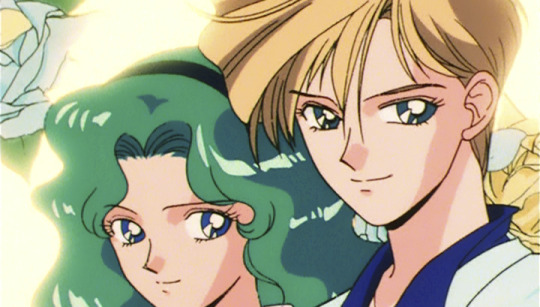
Possibly the most widely-known F/F couple in anime, Haruka and Michiru (Ogata Megumi and Katsuki Masako, respectively), make their first appearance in episode 3 of the third season as mysterious newcomers who refuse to work alongside the Sailor Senshi. Apart from being consistently framed as an ideal couple throughout (they practically cruise to victory in a couple’s contest in episode 5 of S3), they also get some juicy narrative moments, being the main subject of the excellent episodes 17 and 21 – the latter being the mid-season climax. They return in S5 but I haven’t watched that season yet.
Side note: Utena fans may be particularly interested to hear that the aforementioned Haruka-and-Michiru-centric episodes 17 and 21 are helmed by key Utena creatives. Both were written by Enokido Yoji, Utena's lead scriptwriter, while episode 17 was directed by Igarashi Takuya (who storyboarded 5 Utena episodes) and episode 21 was directed by Utena director Ikuhara Kunihiko himself.
2. Mai-Hime (26 episodes, 2004) (canon) - Anime News Network | MyAnimeList

Way back when, Mai-Hime was very popular among yuri fans for including a canonically queer female character who was in love with another female character… even though, like in Kannazuki no Miko which was broadcast the same year, she commits sexual assault against her. For those still curious, Mai-Hime starts out as a quirky fighting-monsters-and-going to school anime but turns into a battle royale where characters fight each other using robots – the twist being that the robots symbolise their love for the person most precious to them, and if destroyed, that person will die. The queer storyline comes in only in the last quarter or so, but is compellingly told and at least the queer character isn’t quite as maniacal or otherwise demonised compared to some others (looking at you, Liang Qi in Canaan). It's a fun reveal, so I won't spoil it here even if you're likely to have heard of it already.
3. Psycho-Pass (41 episodes + 3 movies, 2012) (canon) - Anime News Network | MyAnimeList

Psycho-Pass is set in a dystopian world where people are rated on their criminal tendencies; the main characters’ job as police officers is to arrest those whose tendencies exceed a certain level. The F/F is canon but very, very background; one of the surprise twists of the finale is that forensics expert Karanomori Shion (Sawashiro Miyuki), whose appearance screams “sexy doctor character” but is played with surprising warmth by Sawashiro, is actually in a relationship with seemingly aloof field officer Kunizuka Yayoi (Itou Shizuka). I only watched the first season and so can’t comment on the rest, but apparently they are still in a relationship in the third season.
4. My Next Life as a Villainess: All Routes Lead to Doom! (24 episodes + movie, 2020) (canon) - Anime News Network | MyAnimeList
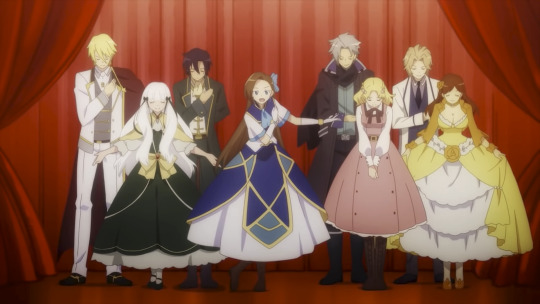
An adaptation of Yamaguchi Satoru’s popular light novel series, this show headed the wave of reincarnated-villainess isekai, focusing on the bumbling Catarina Claes (Uchida Maaya) – in actuality an otaku who has been reincarnated into an otome game – as she tries desperately to remove her character’s image as a villainess and thereby inadvertently attracts the attentions of many a suitor. Among this reverse harem are three female characters Maria Campbell (Hayami Saori), Mary Hunt (Okasaki Miho), and Sophia Ascart (Minase Inori).
While the female suitors’ romantic interest in Catarina is generally not undermined or played as a joke, they are not necessarily treated as equally valid options compared to the male suitors - it doesn't feel like Catarina has a real chance of ending up with any of the female characters. I've heard this starts becoming more obvious in S2 (which I haven't watched), which apparently focuses on Catarina's relationship development with one particular male suitor compared to the others. Also, the VN spinoff had 6 routes in total (all 4 male suitors + 2 original male characters) but did not include a single female route, despite being non-canon in nature.
480 notes
·
View notes
Text
Yuri Subtext (?) Anime List

A supplement to my earlier yuri anime masterlist, this list covers anime which aren’t marketed as yuri but which prominently feature F/F pairs, whether canonical or subtext! Since subtext is so subjective, this post only includes series which I’ve actually watched, and so is by no means intended to be comprehensive.
Also, since the above description would not cover certain series with well-known yuri pairings, I've also included a few "bonus rounds" for the curious (although these are still limited to series I have watched).
At-a-glance list:
Revolutionary Girl Utena (39 episodes + 1 movie, 1997)
NOIR (26 episodes, 2001)
Puella Magi Madoka Magica (12 episodes, 2011)
Haibane Renmei (13 episodes, 2002)
.hack//SIGN (26 episodes, 2002)
Read or Die / R.O.D. the TV (26 episodes, 2003)
Mobile Suit Gundam: The Witch From Mercury (24 episodes, 2022)
Black Rock Shooter (8 episodes, 2010)
Izetta: The Last Witch (12 episodes, 2016)
Violet Evergarden: Eternity and the Auto Memory Doll (movie, 2019)
Canaan (13 episodes, 2009)
Ga-Rei: Zero (12 episodes, 2008)
Bonus rounds:
Sailor Moon S3 (38 episodes, 1994) (subtext)
Mai-Hime (26 episodes, 2004) (canon)
Psycho-Pass (41 episodes + 3 movies, 2012) (canon)
My Next Life as a Villainess: All Routes Lead to Doom! (24 episodes + movie, 2020) (canon)
Summaries under the cut!
1. Revolutionary Girl Utena (39 episodes + 1 movie, 1997) - Anime News Network | MyAnimeList

(Copied from the Yuri Anime Masterlist post, since technically it wasn’t marketed as yuri)
When she was a child, Tenjou Utena (Kawakami Tomoko) was saved by a passerby prince, so she decided that she too wanted to become a prince as an adult. Fast forward to high school, and she hasn’t forgotten that conviction: Utena gets sucked into a series of duels while trying to protect her best friend’s honour. After winning the first duel, she becomes ‘engaged’ to the eccentric “Rose Bride” Himemiya Anthy (Fuchizaki Yuriko), and the two start living together in the same dormitory.
First things first: there are a million content warnings for this series, including implied rape, sexual assault, incest, and homophobia. Although the issues are handled well (in my opinion), it does go to very dark places, so those wanting a light, fun anime to unwind to should look elsewhere. Second, this series is very much a psychological drama utilising the episodic duels as a way of hone in on Utena’s opponents and their stories, so Utena and Anthy’s relationship – though important – is definitely not the focus of the anime. Third, the TV series is limited to hinting at the romantic relationship between Utena and Anthy, not to mention that they spend most of the series being little more than acquaintances rather than actual friends. The movie Adolescence (which can be taken as a retelling or sequel, depending on your perspective) is much more explicit on this front, but also suffers from a significantly shorter runtime and a much more opaque approach to storytelling.
That being said! If you’re okay with all of the above, this series is pretty much essential. The simplistic premise belies a much more complex and nuanced story about gender roles, sexuality, and human relationships and remains one of the smartest anime ever made, over twenty years on.
2. NOIR (26 episodes, 2001) - Anime News Network | MyAnimeList

The first in anime studio Bee Train’s “girls with guns” trilogy, NOIR follows globetrotting assassin duo Mireille Bouquet (Mitsuishi Kotono) and Yuumura Kirika (Kuwashima Houko) as they partner up to search for Kirika’s missing memories and the truth behind Mireille’s parents’ deaths. The series is pleasingly restrained despite the sensational premise, alternating between “business trips” to far-flung locations and snapshots of the pair’s domestic life in Mireille’s Paris apartment, and devoting more time to the unfolding of the relationship between the prickly Mireille and puppy-like Kirika than to action sequences. I won't say too much due to spoilers, but their relationship numbers among my favorites due to how naturally it is developed throughout and how it is very much at the heart of the series both narratively and thematically.
This is also the first anime soundtrack entirely composed by the legendary Kajiura Yuki, heralding a long collaboration with director Mashimo Kouichi, and her mix of classical and modern sounds provides the perfect accompaniment to NOIR’s atmospheric cityscapes. Also, for fans of Mitsuishi’s work (Sailor Moon! Utena! Evangelion!), I’d say NOIR is a must-watch for her performance alone; her Mireille is brittle and proud, and she brings so much humanity and nuance to the role. In fact, I don’t care if you’re a fan of Mitsuishi or Kajiura or assassins or whatever, please just try the first episode— this anime deserves way more love!
3. Puella Magi Madoka Magica (12 episodes, 2011) - Anime News Network | MyAnimeList

Puella Magi Madoka Magica opens with ordinary middle school girl Kaname Madoka (Yuuki Aoi) standing in the ruins of her hometown, watching as a lone girl struggles to defend what remains of the city against a much more powerful enemy. A little rabbit-like creature informs Madoka that the girl is sure to lose without her help, and so Madoka decides to become a magical girl right then and there— at which point she wakes up and dismisses it as a strange nightmare. But then that very day, her school receives a new transfer student who looks just like that mysterious girl, and she also finds a hurt animal that closely resembles the rabbit-like creature from her dream. Madoka is then faced with certain questions: do magical girls actually exist, and will she become one herself?
Since Madoka Magica was all the rage back in the early 2010s, I don’t think it too much of a spoiler to say that the cheery first three episodes hide a dark, gritty story which uses the concept of magical girls to explore the tumultuousness of adolescence. The queer subtext only comes in at the end but tight plotting and inventive presentation make this show a quick watch— and if you’re the type who likes queerness in fiction to be intense, world-shakingly significant, and a wee bit problematic, the payoff should be more than enough. A word of warning: there is a movie sequel called Rebellion, but if you’re happy with the ending of the anime, it’s best not to watch it (although I love the movie, myself).
Side note: I won’t go into it too much due to spoilers but if you liked Madoka Magica you might want to check out Serial Experiments Lain – even if most of it is utterly incomprehensible (as it was to me), it’s worth watching until the very end (wink). Also, for the rare fan of Rebellion, Adolescence of Utena is a must-watch if you haven’t checked it out already; so much can be said about its conceptual and aesthetic influences on Rebellion!
4. Haibane Renmei (13 episodes, 2002) - Anime News Network | MyAnimeList

(Note: slight spoilers about the tone and overall themes of the show – but I think it’s necessary for the purpose of writing a more representative summary.)
Written by ABe Yoshitoshi – character designer of cult classic anime Serial Experiments Lain and author of the very unfinished manga which this show adapts and significantly develops – Haibane Renmei starts off as a light-fantasy slice-of-life anime following freshly-arrived Rakka (Hirohashi Ryou) as she searches for a suitable job in the town of Glie, before transforming into a nuanced exploration of grief and depression about halfway through. To say more would be really too spoilery, but I just want to say that this has probably the most grounded and sensitive depiction of depression I have seen in an anime; it shows that sometimes people struggle even if everyone around them is kind and supportive, but remains hopeful about the healing power of time and understanding. The subtext is between the protagonist and Reki (Noda Junko), the first person she meets, who also helps her get acclimatised to her new life in Glie. Again, I won’t say more, but their relationship really is wonderful. That being said, this show does touch upon suicide and suicidal ideation in the course of discussing these themes, so please steer clear if that is something you are wary of.
5. .hack//SIGN (26 episodes, 2002) - Anime News Network | MyAnimeList

A standalone spinoff of the .hack PS2 games, this show was the most well-known anime about players getting trapped inside a multiplayer game before Sword Art Online’s arrival in 2012 (ironically, Kajiura Yuki composed the music for both). Rather than being an action-adventure story about a heroic protagonist trying to find a way back to the real world, SIGN stands out as an introspective piece, far more interested in the psychology of those who play online games and the issues of human connection and identity. In fact, the female protagonist is all too happy to remain within the MMORPG as male player-avatar Tsukasa (Saiga Mitsuki) after becoming unable to log out; the story is more about how the player grows to accept the real world with the help of the other players she meets, rather than about figuring out the exit route.
On the F/F side, some way into the series, Tsukasa makes an instant connection with fellow player-character Subaru (Nazuka Kaori) and they soon start spending a lot of time together. I really love their scenes together; the series' masterful use of body language, framing, and music all comes together to create these beautifully tender moments of intimacy. Although there’s no kiss scene nor explicit discussion of dating etc., a lot of the other characters talk about their relationship and perceive it as being romantic, to the point where one gets homophobically “worried” about Subaru when they find out that the player controlling male avatar Tsukasa is female. Tsukasa and Subaru's relationship becomes a lynchpin for both characters' development, and in general is used to illustrate the series' underlying themes in a thoughtful and heartwarming way.
6. Read or Die / R.O.D. the TV (26 episodes, 2003) Anime News Network | MyAnimeList

A spinoff of the Read or Die series which takes more from espionage thrillers and Hong Kong action flicks than shounen anime, R.O.D. the TV takes the unusual approach of starting with its main character - elite paper-maniuplating superspy Yomiko Readman (Miura Rieko) - being nowhere to be seen after burning down the British Library in a dramatic resignation announcement. Instead of focusing on her, or the spy agencies clashing in her absence, the story instead follows her friend Sumiregawa Nenene (Yukino Satsuki), who joins up with a trio of sisters with paper-manipulating powers and criminal connections in her quest to find out what happened to Yomiko. The queerness is mainly implied through Nenene's focus on Yomiko, which is unrequited and sadly fizzles out narratively speaking in the back half. Unfortunately, this is coupled with an increased focus on more heteronormative topics, such as Yomiko's grief over her dead male lover, and the child one of the characters had with the villain of the OVA. That being said, I also want to shout out this series' surprisingly earnest depiction of budding queerness in a young (like, elementary-school young) side character - something that is rare in fiction even now.
7. Mobile Suit Gundam: The Witch from Mercury (24 episodes, 2022) - Anime News Network | MyAnimeList

The most recent entry on this list by far (the final episode aired just a day ago at time of writing), The Witch from Mercury initially seems to forgo the Gundam franchise’s usual grand scale, being set in an academy run by the corporate giant Benerit Group. Main character and new student Suletta Mercury (Ichinose Kana) - the franchise’s first female protagonist since its beginnings in 1979 - accidentally bumbles her way into fighting a mecha duel, and, when she wins, is shocked to find that she is now engaged to the sole heiress of that self-same corporate giant, her classmate Miorine Rembran (Lynn). So far so Utena, but after the first episode, things start to diverge significantly: though the duels continue, the focus shifts to how big-picture tensions such as the manoeuvring within the Benerit Group and the conflict between the space colonisers and people on Earth play out within the student body, and how the arrival of Suletta and her mysteriously cutting-edge mecha start to shake up the status quo… until things come to an explosive head.
For those who curious about G-Witch due to Suletta and Miorine, but who wouldn’t normally be interested in Gundam or space operas, I’ll just say that if the hype has led you to expect a big queer romance where Suletta and Miorine shout their love from the rooftops, well, that’s not how it goes. It’s a mecha anime first and foremost, after all! But lower your expectations and you may be pleasantly surprised. Season 1 offers plenty to enjoy in terms of Suletta’s earnest attempts to be a good “bridegroom” and the tsundere Miorine’s bouts of jealousy over Suletta. And while their relationship takes a bit of a back seat in Season 2 due to there being So Much going on, it remains one of the key elements of the series and their scenes together are the emotional peaks of the season.
Side note: Some might criticise Gundam for taking so long to have a female main character, but let’s not forget about how the even older Ultraman (1966), Kamen Rider (1971), and Super Sentai (1975) franchises still have not had a single mainline series featuring a female protagonist… Come on guys, I’m dying for a female-led Kamen Rider over here!
8. Black Rock Shooter (8 episodes, 2010) - Anime News Network | MyAnimeList

One of the two anime inspired by the Hatsune Miku song of the same name, this Okada Mari-penned series hones in on the passionate friendships and jealousies of a group of middle-school girls. In a twist that feels informed by the psychological allegory of the popular Persona games, this interpersonal drama plays out in the surreal battle world of the music video, with the titular Black Rock Shooter being the main character’s alter-ego. Of particular interest is the first half’s focus on the blossoming friendship between protagonist Kuroi Mato (Hanazawa Kana) and her shy classmate Takanashi Yomi (Sawashiro Miyuki), which has strong overtones of two girls developing crushes on each other – it doesn’t go smoothly, but hey, that’s life.
9. Izetta: The Last Witch (12 episodes, 2016) - Anime News Network | MyAnimeList

Set during what is basically World War 2, Izetta: The Last Witch asks the daring question of “What if a small European country about to be invaded by alternate-history Nazi Germany could fight back with magic… and what if it was (subtextually) yuri?” The show follows politically-minded princess Finé as she and her best friend (read: girlfriend) Izetta think up ways to leverage the latter’s witchy gifts to save the country from invasion – a rare case of a military anime where female characters are significantly involved at the strategic stage. Those who enjoy the classic princess-and-knight trope may find something to like as long as they are fine with Finé and Izetta not having much relationship development (as their dynamic is established from the start) and them not having many one-on-one scenes together (as the series’ main focus is on the political manoeuvring). Note that this show is also pretty heavy on the fanservice – IIRC there was at least one moment of egregious sexualisation per episode.
Side note: those who like Izetta may also want to check out Last Exile: Fam, the Silver Wing, a female-focused dieselpunk anime with a lot of military strategizing and a very cool world setting, though Izetta is better-paced and the main relationship is much more plot-significant. (That being said I do like the relationship between Fam side characters Tatiana and Alistair… Tatiana is probably the adult character with the most screentime in Fam, being the main characters’ commanding officer, and although it’s very background, she has this cutely settled dynamic with former piloting partner turned wife right-hand woman Alistair.)
10. Violet Evergarden: Eternity and the Auto Memory Doll (movie, 2019) - Anime News Network | MyAnimeList

(Note: this entry’s a slightly weird one, it only covers the first 40 minutes of this movie due to it being basically two episodic stories smushed together into a single package, and only the earlier story is relevant to this list.)
In this standalone spinoff of the Violet Evergarden anime series – itself an adaptation of the light novel series by Akatsuki Kana – the titular protagonist Violet (Ishikawa Yui) takes a break from ghostwriting letters to serve as companion to aloof young noblewoman Isabella York (Kotobuki Minako) in her last months of finishing school. The story is a quiet coming-of-age tale focusing on how the kind (and rather dashing!) Violet helps Isabella to open up, or, in simpler terms, it’s fodder for butler-and-lady fans. Don’t get your hopes up too much, though: Violet learning about her romantic feelings for her deceased male superior is one of the main throughlines of the anime, and this (half of the) movie also ends with a heterosexual arranged marriage for Isabella. That being said, this movie is really a feast for the eyes, its historical-fantasy setting being brought out with beautiful backgrounds and detailed linework, so it’s worth checking out if you don’t mind the very Class S narrative.
Side note: if you want F/F butler-and-lady or princess-and-knight vibes I would really recommend watching Fate/Zero for Saber and Irisviel – yes Irisviel is already married to one of the (male) main characters and yes Saber is absolutely the main love interest for the famously-straight Fate/stay night, but their dynamic is really good and Saber gets to wear a stylish suit and be all chivalrous to a woman… Please watch the third episode of season 1 at least…
11. Canaan (13 episodes, 2009) - Anime News Network | MyAnimeList

There’s quite a lot going on in Canaan – perhaps unsurprisingly so for a spinoff of the FMV visual novel 428: Shibuya Scramble, which is famous for its intertwined storylines – but in true action-movie blockbuster style, all you really need to know is that the titular mercenary Canaan (Sawashiro Miyuki) is on a hunt for her mentor’s protégé-turned-murderer, and a lot of flashy fighting is involved. Also, there's no need to worry if you haven't played the original game, as Canaan is pretty much a standalone work and all of the significant characters are original to the anime. Yuri-minded viewers may enjoy her clashes with the villain Alphard (Sakamoto Maaya), but the main source of F/F subtext is her relationship with the young photographer Maria (Nanjo Yoshino), for whom she cares deeply and must rescue on multiple occasions. However, do be warned that the one canonically queer character in the show – Alphard’s subordinate Liang Qi (Tanaka Rie), who is fixated on her boss – is handled very badly, being portrayed as a raving predatory lesbian who is mocked, rejected, and finally killed by the object of her affections. Canaan and Maria’s relationship is also framed very definitively as friendship by the end of the series, although they don’t get paired off with male characters. IIRC there’s also some fanservice but I can’t remember the details as it was a long time ago, sorry.
12. Ga-Rei: Zero (12 episodes, 2008) - Anime News Network | MyAnimeList

Back in the old days, I had heard this show talked about in the same breath as yuri classics such as Kannazuki no Miko and Mai-Hime, and, well, like those series it comes with significant caveats (though thankfully there is no sexual assault). Although it’s a prequel to the Ga-Rei manga by Segawa Hajime, the anime is basically standalone and focuses on original characters Kagura (Chihara Minori) and Yomi (Mizuhara Kaoru), the latter of whom welcomes protagonist Kagura into her family and demon-hunting squad, only to leave the team in a devastating betrayal. After the explosive opening, the series jumps back to explore the events leading up to that point; fans of director Aoki Ei’s work on Fate/Zero should note that the dark tone disappears in the third episode and never quite comes back even when things get serious. Viewers should also keep their F/F expectations in check, since despite the premise I would say the series is more plot- than character-focused, and on top of that a significant amount of time is devoted to Yomi’s relationship with her male fiancé (Yomi and Kagura have more screentime together, but there’s not much development whereas Yomi and her fiancé are given a whole romantic arc). There is one very fanservicey scene between Kagura and Yomi in a car early on (in episode 3?) which viewers may want to skip, but IIRC it’s an outlier and the rest of the series is nowhere near as bad.
Bonus Rounds
1. Sailor Moon S / Season 3 (38 episodes, 1994) (subtext) - Anime News Network | MyAnimeList

Possibly the most widely-known F/F couple in anime, Haruka and Michiru (Ogata Megumi and Katsuki Masako, respectively), make their first appearance in episode 3 of the third season as mysterious newcomers who refuse to work alongside the Sailor Senshi. Apart from being consistently framed as an ideal couple throughout (they practically cruise to victory in a couple’s contest in episode 5 of S3), they also get some juicy narrative moments, being the main subject of the excellent episodes 17 and 21 – the latter being the mid-season climax. They return in S5 but I haven’t watched that season yet.
Side note: Utena fans may be particularly interested to hear that the aforementioned Haruka-and-Michiru-centric episodes 17 and 21 are helmed by key Utena creatives. Both were written by Enokido Yoji, Utena's lead scriptwriter, while episode 17 was directed by Igarashi Takuya (who storyboarded 5 Utena episodes) and episode 21 was directed by Utena director Ikuhara Kunihiko himself.
2. Mai-Hime (26 episodes, 2004) (canon) - Anime News Network | MyAnimeList

Way back when, Mai-Hime was very popular among yuri fans for including a canonically queer female character who was in love with another female character… even though, like in Kannazuki no Miko which was broadcast the same year, she commits sexual assault against her. For those still curious, Mai-Hime starts out as a quirky fighting-monsters-and-going to school anime but turns into a battle royale where characters fight each other using robots – the twist being that the robots symbolise their love for the person most precious to them, and if destroyed, that person will die. The queer storyline comes in only in the last quarter or so, but is compellingly told and at least the queer character isn’t quite as maniacal or otherwise demonised compared to some others (looking at you, Liang Qi in Canaan). It's a fun reveal, so I won't spoil it here even if you're likely to have heard of it already.
3. Psycho-Pass (41 episodes + 3 movies, 2012) (canon) - Anime News Network | MyAnimeList

Psycho-Pass is set in a dystopian world where people are rated on their criminal tendencies; the main characters’ job as police officers is to arrest those whose tendencies exceed a certain level. The F/F is canon but very, very background; one of the surprise twists of the finale is that forensics expert Karanomori Shion (Sawashiro Miyuki), whose appearance screams “sexy doctor character” but is played with surprising warmth by Sawashiro, is actually in a relationship with seemingly aloof field officer Kunizuka Yayoi (Itou Shizuka). I only watched the first season and so can’t comment on the rest, but apparently they are still in a relationship in the third season.
4. My Next Life as a Villainess: All Routes Lead to Doom! (24 episodes + movie, 2020) (canon) - Anime News Network | MyAnimeList

An adaptation of Yamaguchi Satoru’s popular light novel series, this show headed the wave of reincarnated-villainess isekai, focusing on the bumbling Catarina Claes (Uchida Maaya) – in actuality an otaku who has been reincarnated into an otome game – as she tries desperately to remove her character’s image as a villainess and thereby inadvertently attracts the attentions of many a suitor. Among this reverse harem are three female characters Maria Campbell (Hayami Saori), Mary Hunt (Okasaki Miho), and Sophia Ascart (Minase Inori).
While the female suitors’ romantic interest in Catarina is generally not undermined or played as a joke, they are not necessarily treated as equally valid options compared to the male suitors - it doesn't feel like Catarina has a real chance of ending up with any of the female characters. I've heard this starts becoming more obvious in S2 (which I haven't watched), which apparently focuses on Catarina's relationship development with one particular male suitor compared to the others. Also, the VN spinoff had 6 routes in total (all 4 male suitors + 2 original male characters) but did not include a single female route, despite being non-canon in nature.
#yuri#yuri anime#lesbian#revolutionary girl utena#g witch#puella magi madoka magica#sailor moon#violet evergarden#black rock shooter#psycho pass#my next life as a villainess#haibane renmei#noir anime#read or die#shuumatsu no izetta#canaan anime#ga rei zero#mai hime#dot hack#.hack//sign#wlw media#wlw anime#list#fate zero#last exile#wlw recommendations
480 notes
·
View notes
Photo

Kamen Rider Revice (HanaSaku’s Version)
for every fan that wants to relive their favorite moments we present to you: every hana/sakura scene ever!
LINK: [google drive]
EDITOR’S NOTES
subs: IzuSubs
scenes are edited by episode, some episodes were combined if they all fit together plotwise
i left in some individual character scenes for context or bc i liked them hehe
will update as the series continues!
#tokusatsu#compilations#kamen rider revice#it's a joy to see a proper femslash ship in a toku show outside of pgsm!#although admittedly i have not watched kiva or gokaiger yet
47 notes
·
View notes
Text
youtube
A Gay Girl's Guide to Korean Musicals (with English subtitles!)
People often associate musicals with male gayness (both onstage and off) but there's stuff out there for female-oriented queers too! It's just harder to find, which is why I put this video together despite not knowing Korean.
This list isn't comprehensive and I deliberately chose musicals with either queer female characters or gender-free casting (i.e. female actors playing male roles), except for Bernarda Alba, which is special as it’s by far the largest-scale all-female production with 10 characters. Obviously there are many Korean musicals out there which don't meet these criteria and are still of interest to the queers, but I wanted to highlight these in particular as they are, apart from Rebecca, not as well-known. I highly recommend checking out @koreanmusicals for more information on Korean musicals generally!
Note: Again, I don’t understand Korean and relied heavily on machine translation and the original lyrics for licenced productions, so any errors in the subtitles or explanations are mine. Corrections are very welcome!
At-a-glance list:
1. Lizze (리지)
2. Midnight (미드나잇)
3. Rebecca (레베카)
4. Pirate (해적)
5. V Ever After (V 에버 애프터)
6. Frida (프리다)
7. Red Cliff (적벽)
8. Bernarda Alba (베르나르다 알바)
More details, including links to the sources, under the cut!
1. LIZZIE (리지)
Photo source: NewsCulture
A. “If You Knew” (네가 안다면)
Actor: J-Min/제이민 (Alice)
Video source: Oh! J-Min 오! 제이민
B. “Will You Stay?” (있어줄래?)
Actors: J-Min/제이민 (Alice – main vocal), Yuria/유리아 (Lizzie)
Video sources: 서울문화투데이TV, OSEN TV, 톱데일리 Top Daily, 더인터 (clip 1, clip 2), PlayDB, TongTongCulture
C. “Sweet Little Sister” (소중한 내 동생)
Actors: Kim Ryeowon/김려원 (Emma – main vocal), Jeon Sung-min/전성민 (Lizzie), Lee Youngmi/이영미 (Bridget), Kim Suyeon/김수연 (Alice)
Video sources: PlayDB, TongTongCulture
2. MIDNIGHT (미드나잇)
Photo source: 666PICTURE
A. “The Future Comes A-Knocking” (그날이 찾아왔어)
Actor: Yuria/유리아 (Visitor)
Video source: 정숲
B. “Everyone’s A Devil, Now and Then” (누구나 악마죠 때로는)
Actors: Jang Bo-ram/장보람 (Visitor), Ju Da-on/주다온 (Woman), Jang Yoo-sang/장유상 (Man), Park Seon-young/박선영 (Player 1), Jina Esther Baek/백지나에스더 (Player 2), Kang Daewoon/강대운 (Player 3), Hwang Ji-sung/황지성 (Player 4)
Video sources: 빚, 라디우스, 탄수화물 섭취량과 행복도의 상관관계
3. REBECCA (레베카)
Photo source: EMK Musical’s official Facebook page
“Rebecca” (레베카)
Actors: Ock Joo Hyun/옥주현 (Mrs. Danvers - main vocal), Lee Ji Hye/이지혜(Protagonist)
Video source: EMK MUSICAL
4. PIRATE (해적)
Photo source: comet7423_PIC
A. “I Won't Let You Go” (가만 안 둬)
Actors: Kim Ee-hoo/김이후 (Anne Bonny), Kim Ryeowon/김려원 (Mary Read)
Video source: KONTENTZ PLANNING
B. “All of us and the dreams we don’t remember” (우리 모두의, 기억나지 않는 꿈)
Actors: Kim Ee-hoo/김이후 (Anne Bonny), Kim Ryeowon/김려원 (Mary Read)
Video source: MN CAM
5. V EVER AFTER (V 에버 애프터)
Photo source: Amor_pic
“Hunt” (사냥)
Actors: Kim Ee-hoo/김이후 (Lehwig – main vocal), Hwang Hannah/황한나 (Frantzschez)
Video source: 컷콜 찍는 먼지
6. FRIDA (프리다)
Photo source: NewsCulture
“Hummingbird” (��밍버드)
Actors: Jeon Su-mi/전수미 (Diego/Reflejar), Kim So-hyang/김소향 (Frida)
Video source: PlayDB
7. RED CLIFF (적벽)
Photo source: L0VE_pearl
“Southeastern Wind” (동남풍)
Actors: Lim Ji-soo (Kong Ming, aka. Zhuge Liang), Lee Geum-mi/이금미 (Zhou Yu), Kim Su-in 김수인 (Lu Su), Choi Ha-neul/최하늘 (Xu Sheng), Lee Yongjeong/이용전 (Zhao Yun, aka. Zhao Zilong), others
Video source: KBS 11’s 국악 한마당, episode 1256 (aired 27 Apr 2019)
8. BERNARDA ALBA (베르나르다 알바)
Photo source: Screencap from livestream
“Prologue” (프롤로그)
Actors: Jung Young-joo/정영주 (Bernarda Alba), Lee Youngmi/이영미 (Foncia – main vocal), Hwang Seok-jeong/황석정 (Maria Josefa), Jung In-ji/정인지 (Angustias), Kim Hwan-Hee/김국희 (Amelia), Oh So-yeon/오소연 (Adela), Baek Eun-hye/백은혜 (Magdalena), Jeong Sung-min/전성민 (Martirio), Kim Hieora/김히어라 (Young Handmaid), Kim Koo-hee/김환희 (Handmaid, Prudence)
Video source: THE MUSICAL
OTHERS
Amadeus (아마데우스)
El crítico (비평가)
Unchain (언체인)
Jane (제인)
Orphans (오펀스)
#lgbtq#sapphic#wlw#lesbian#koreanmusicals#korean musicals#kmusicals#musicaltheatre#musical theater#lizzie the musical#lizzie the rock musical#lizzie korea#midnight musical#rebecca das musical#pirates kmusical#해적#v ever after#V 에버 애프터#frida#프리다#red cliff#red cliffs kmusical#적벽#bernarda alba#bernarda alba musical#베르나르다 알바#j-min#yuria#kim ryeo won#jang bo ram
119 notes
·
View notes